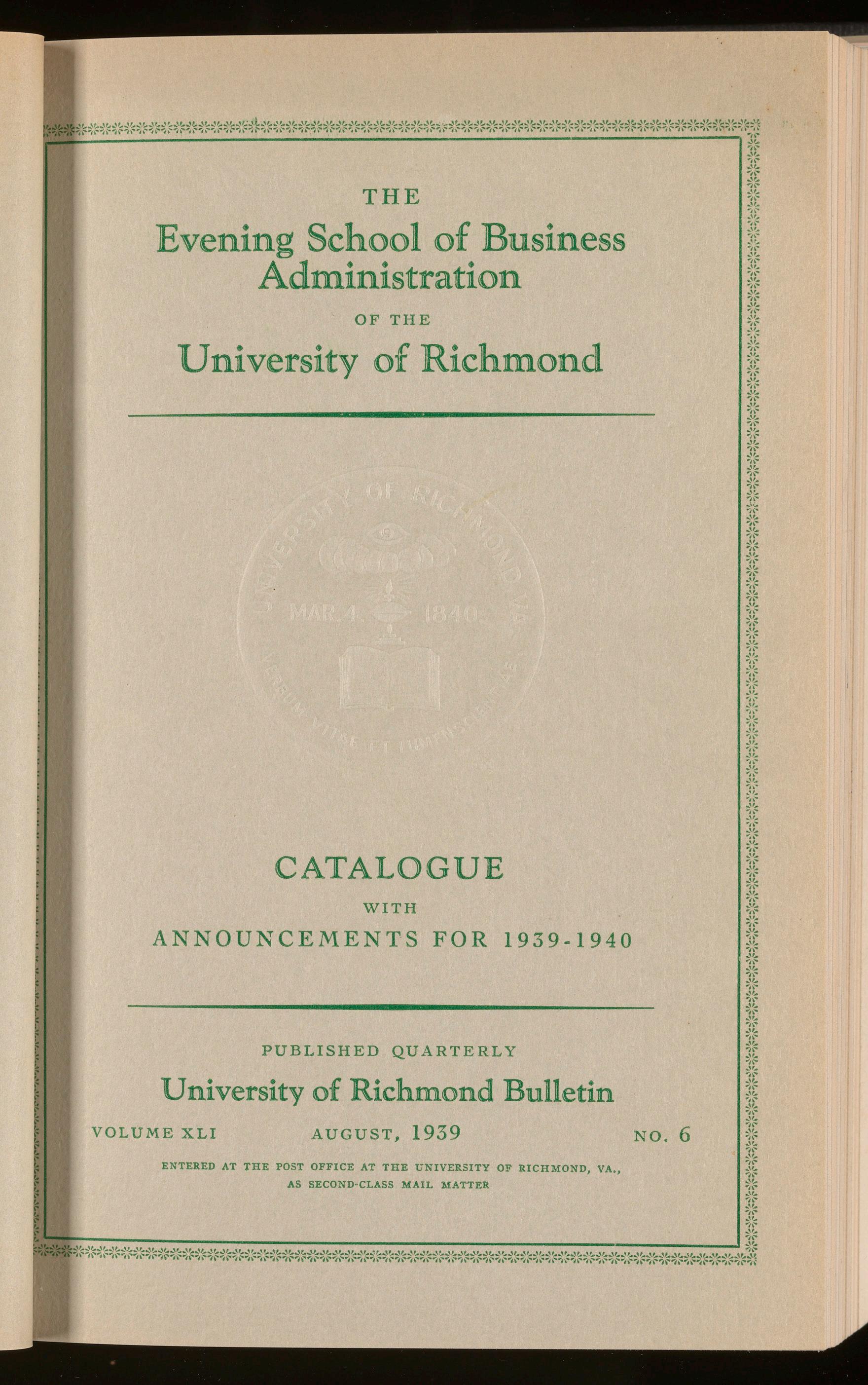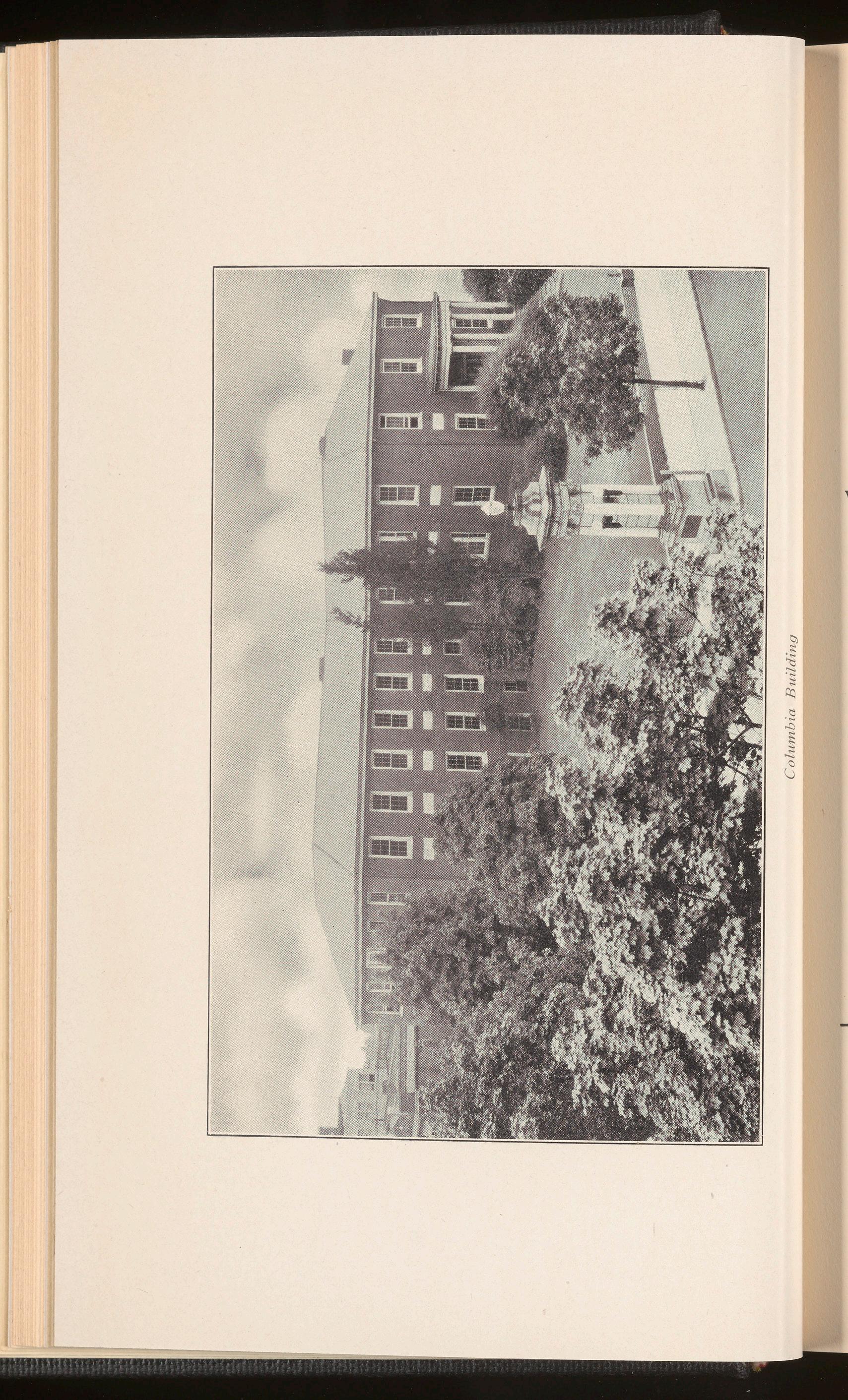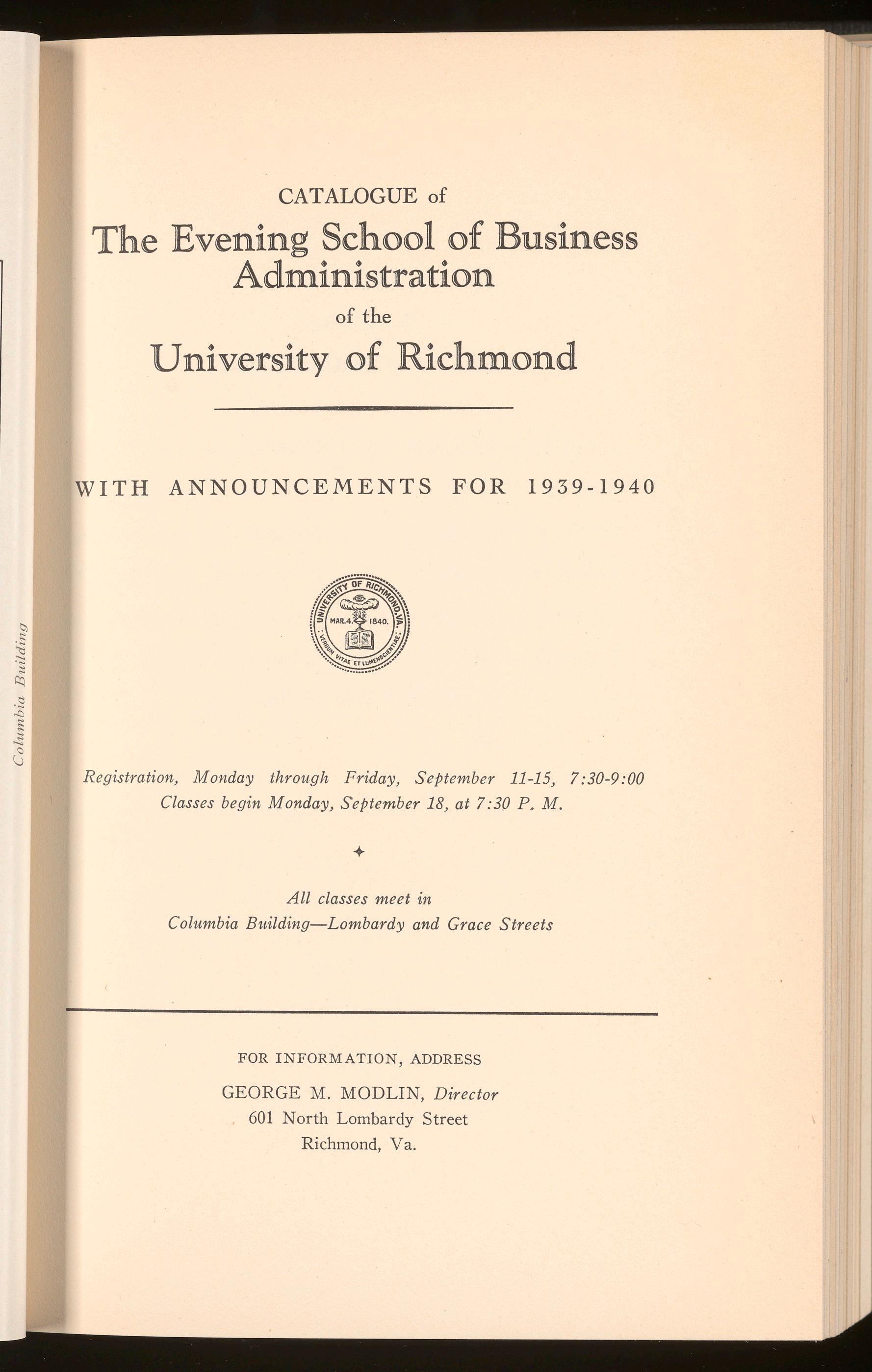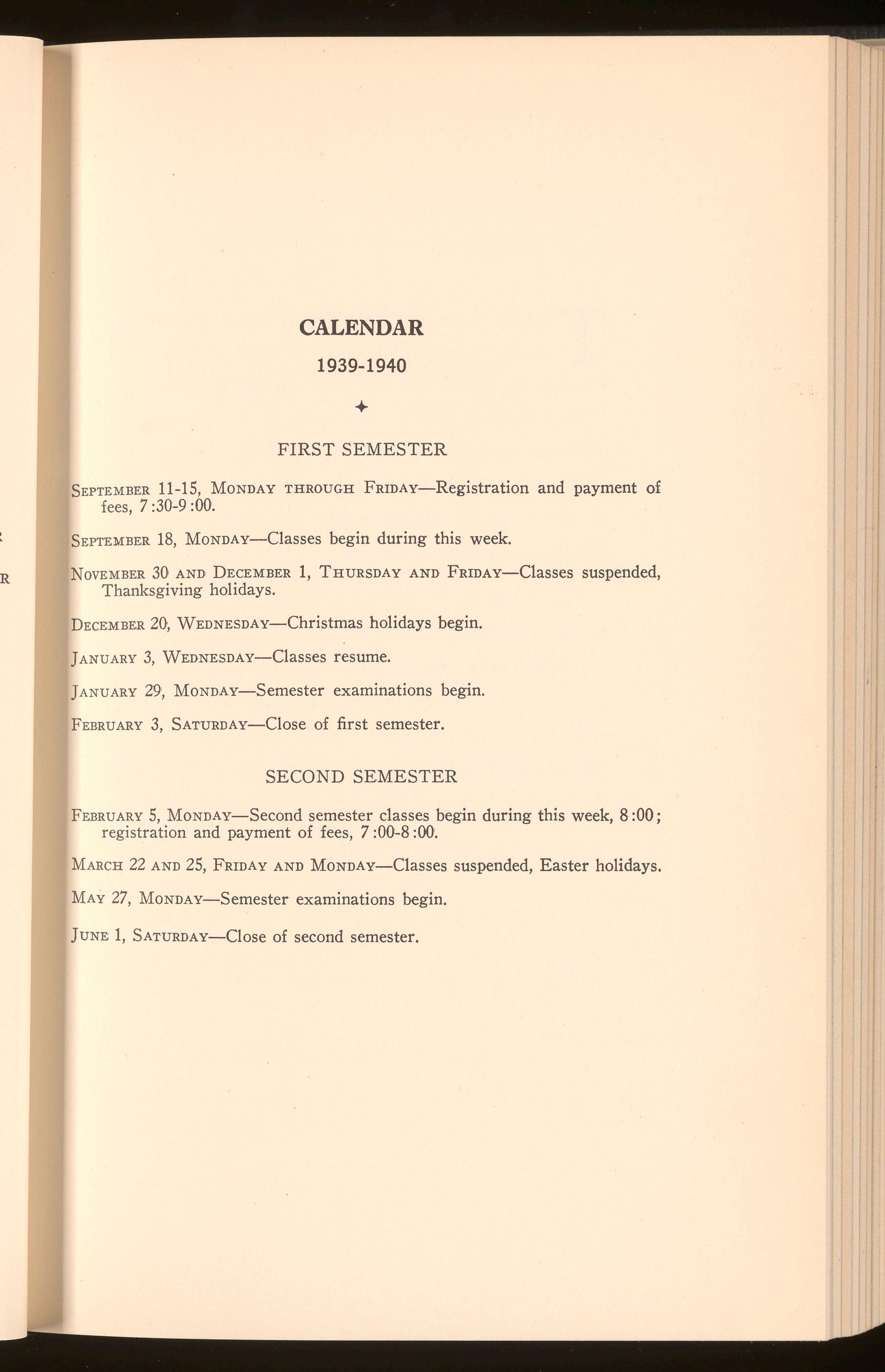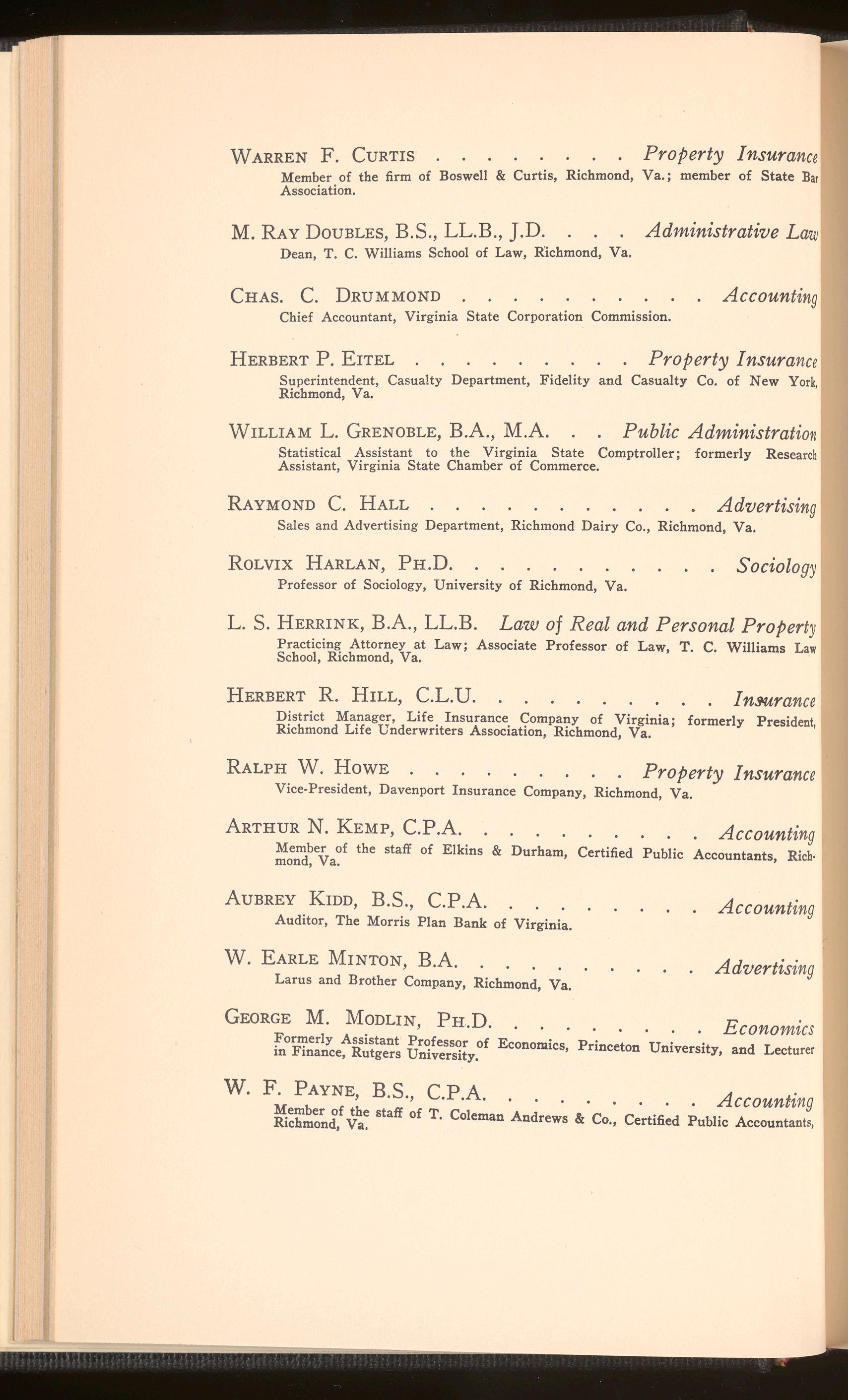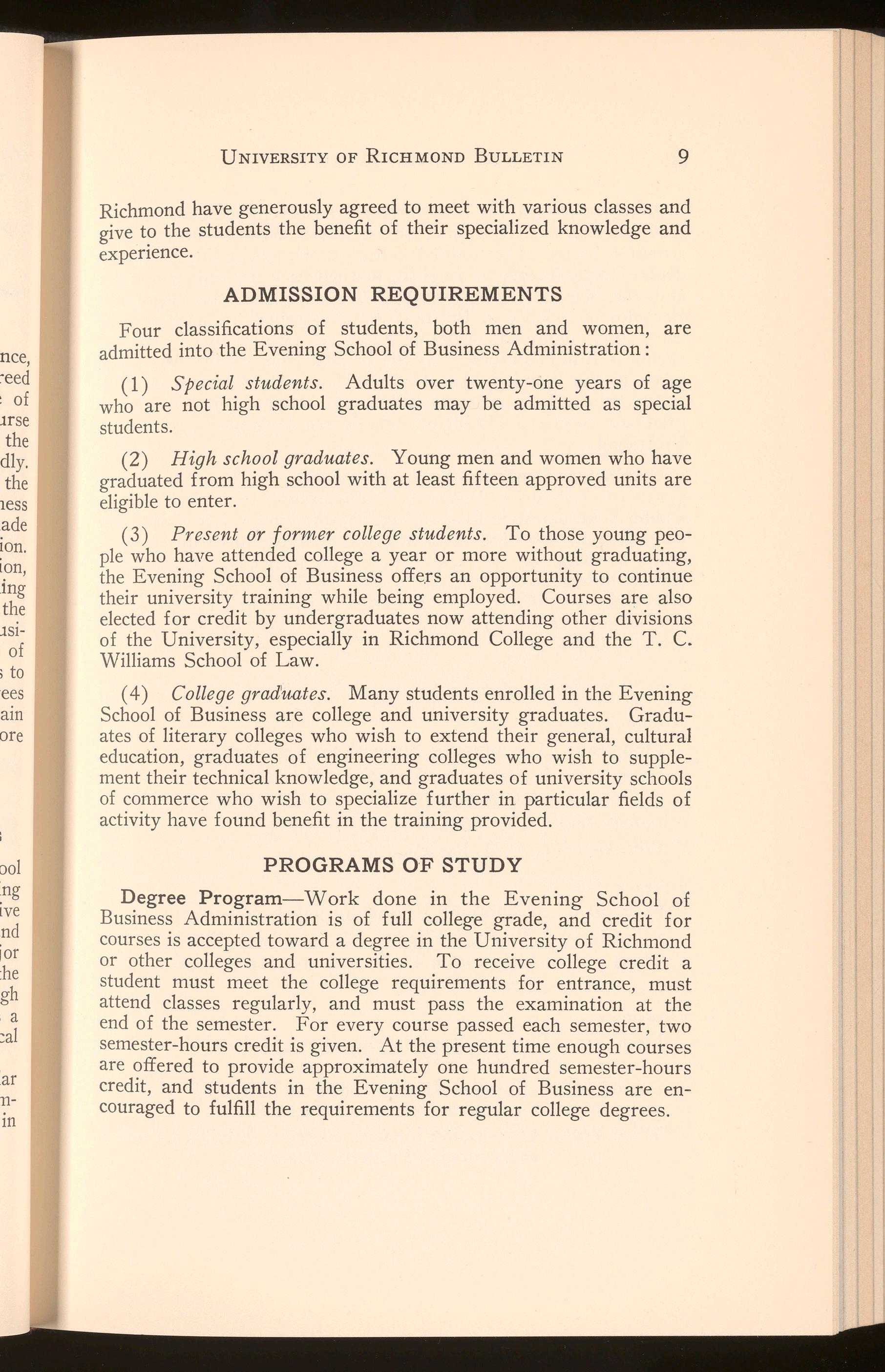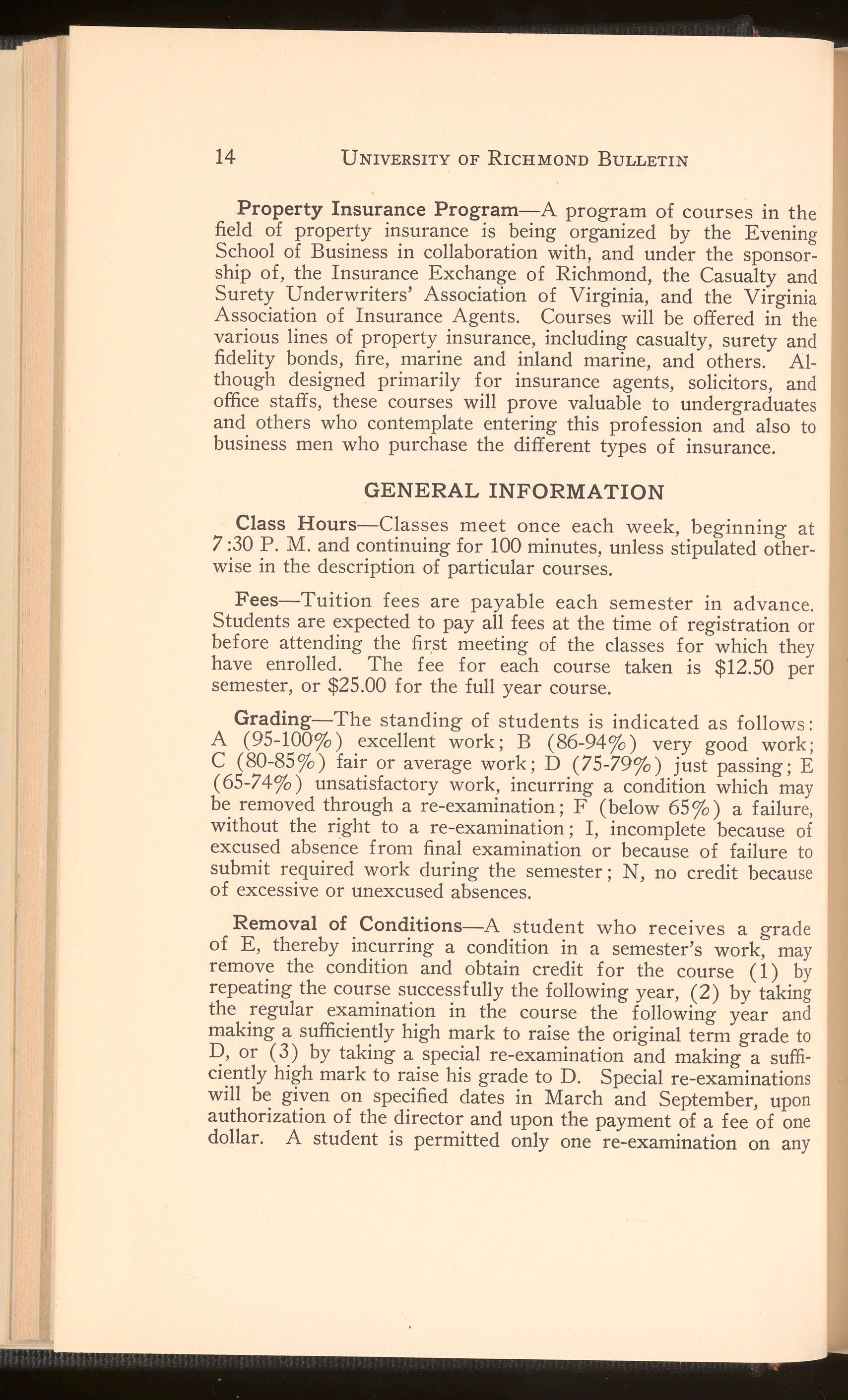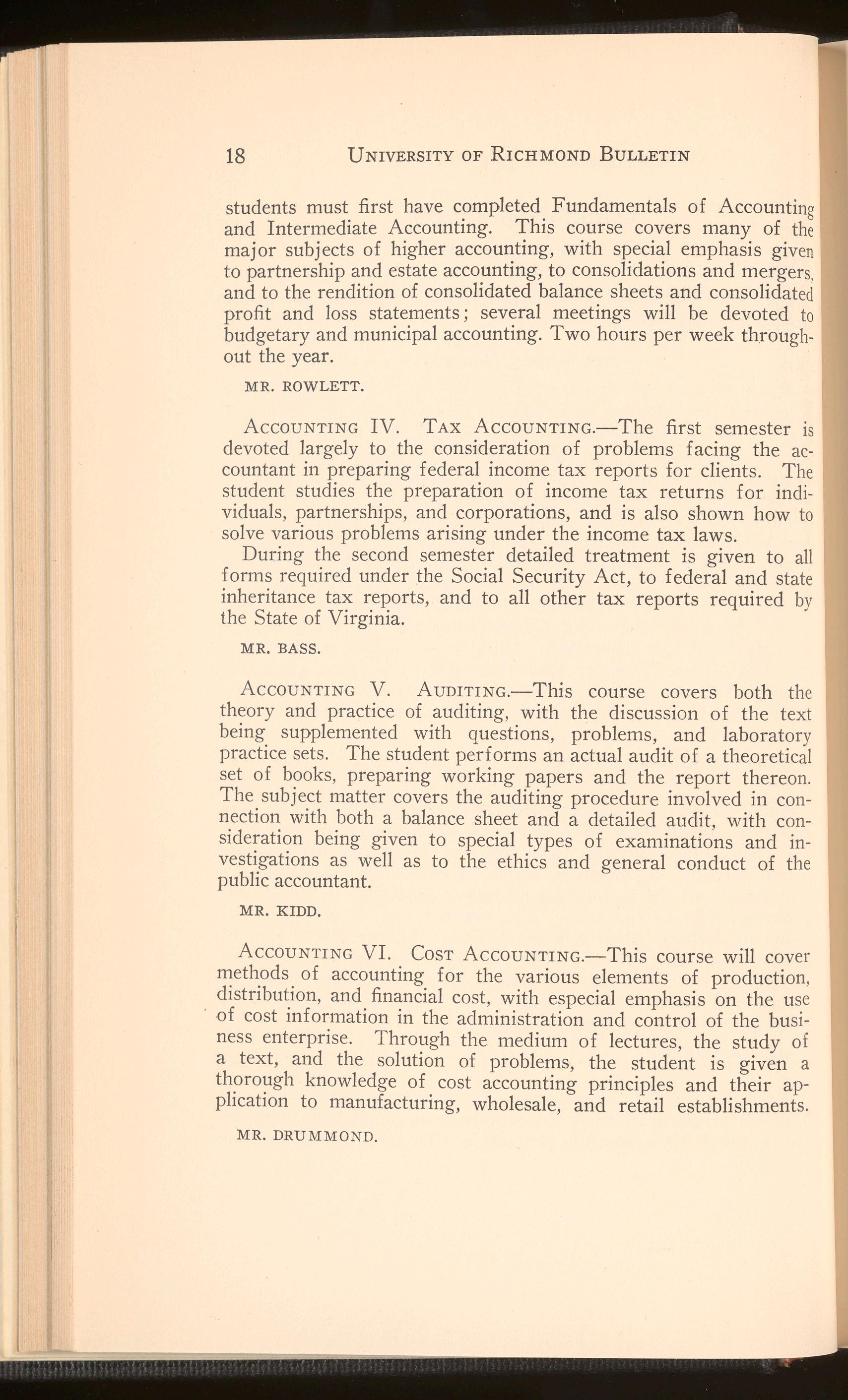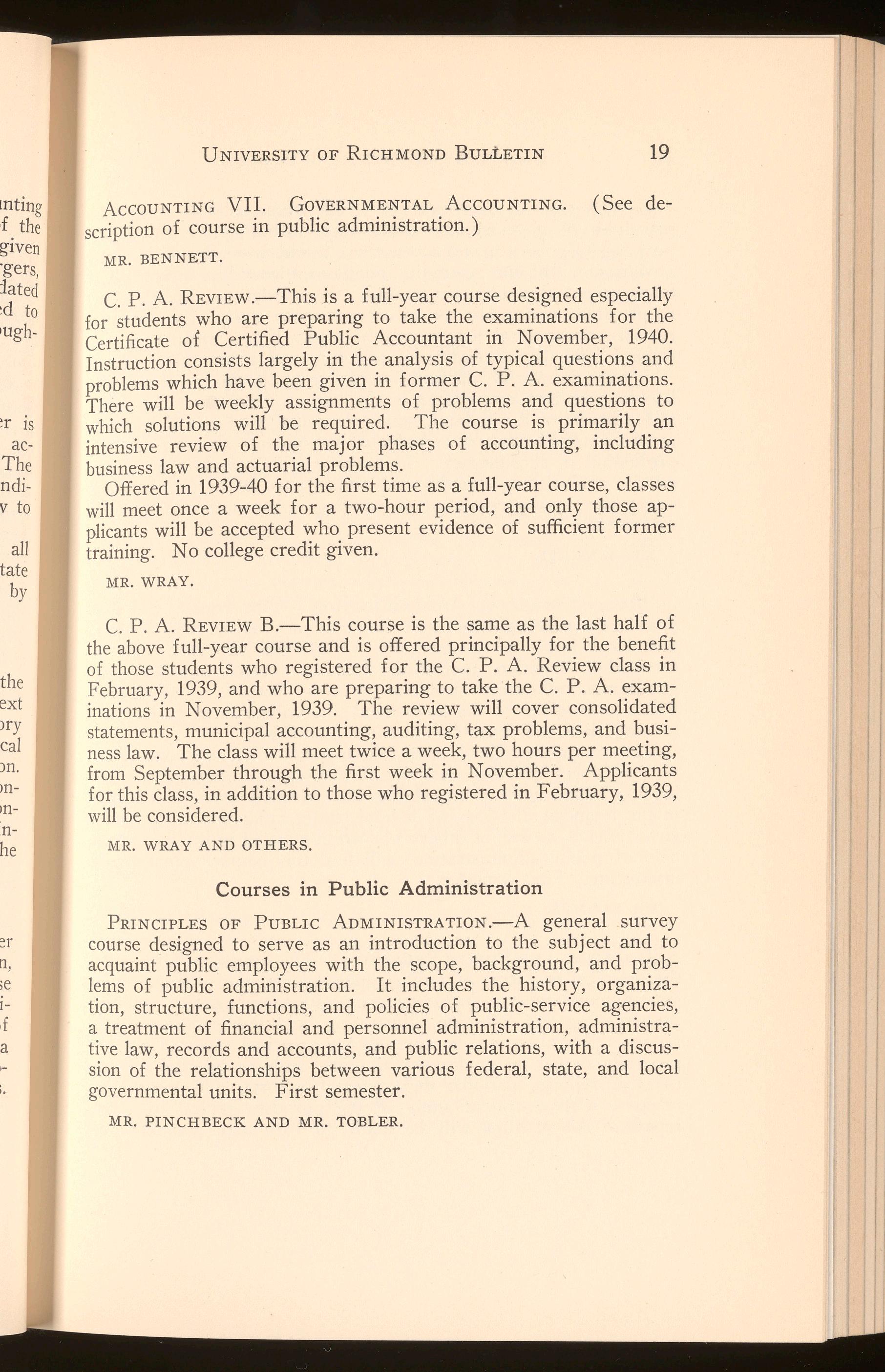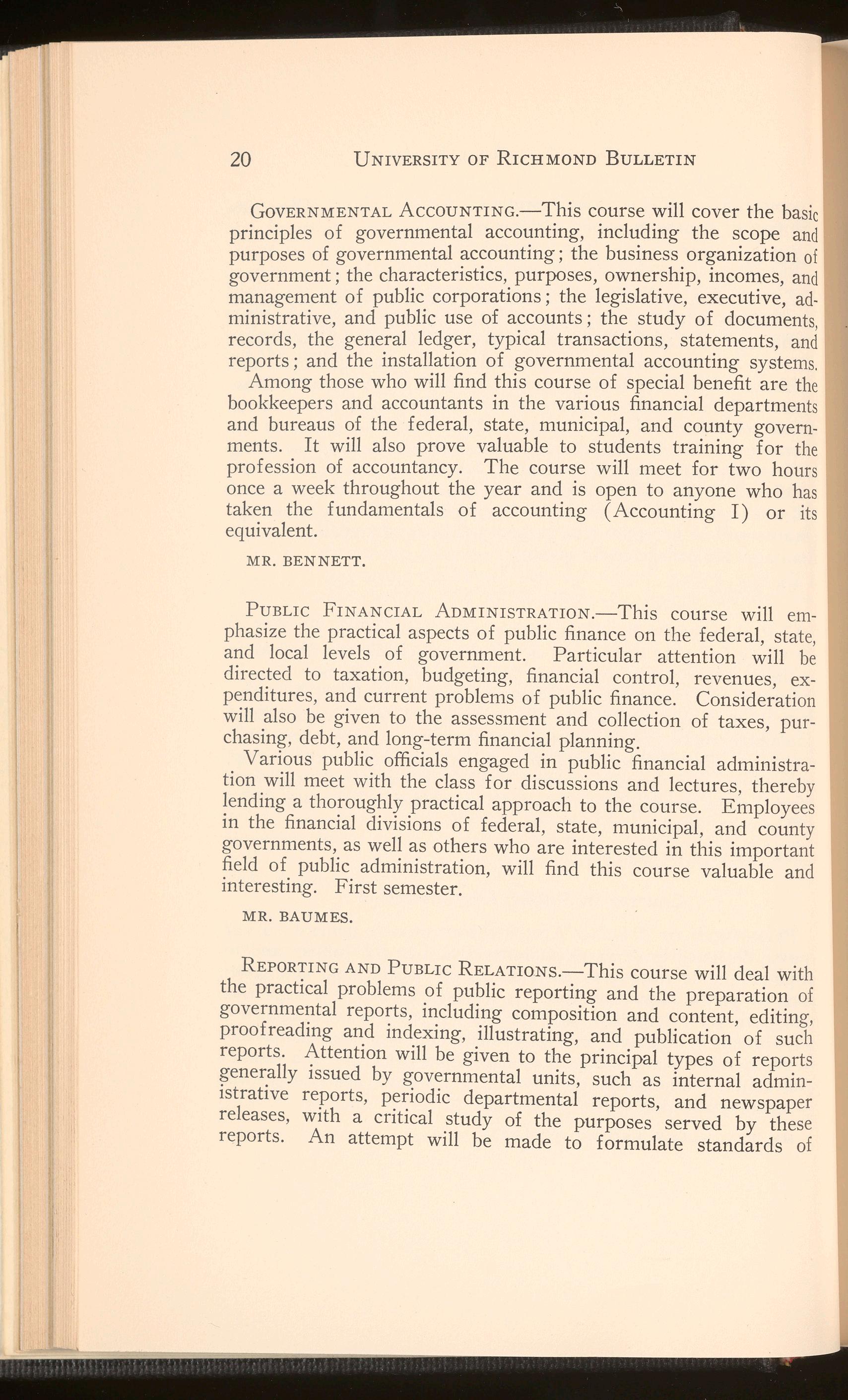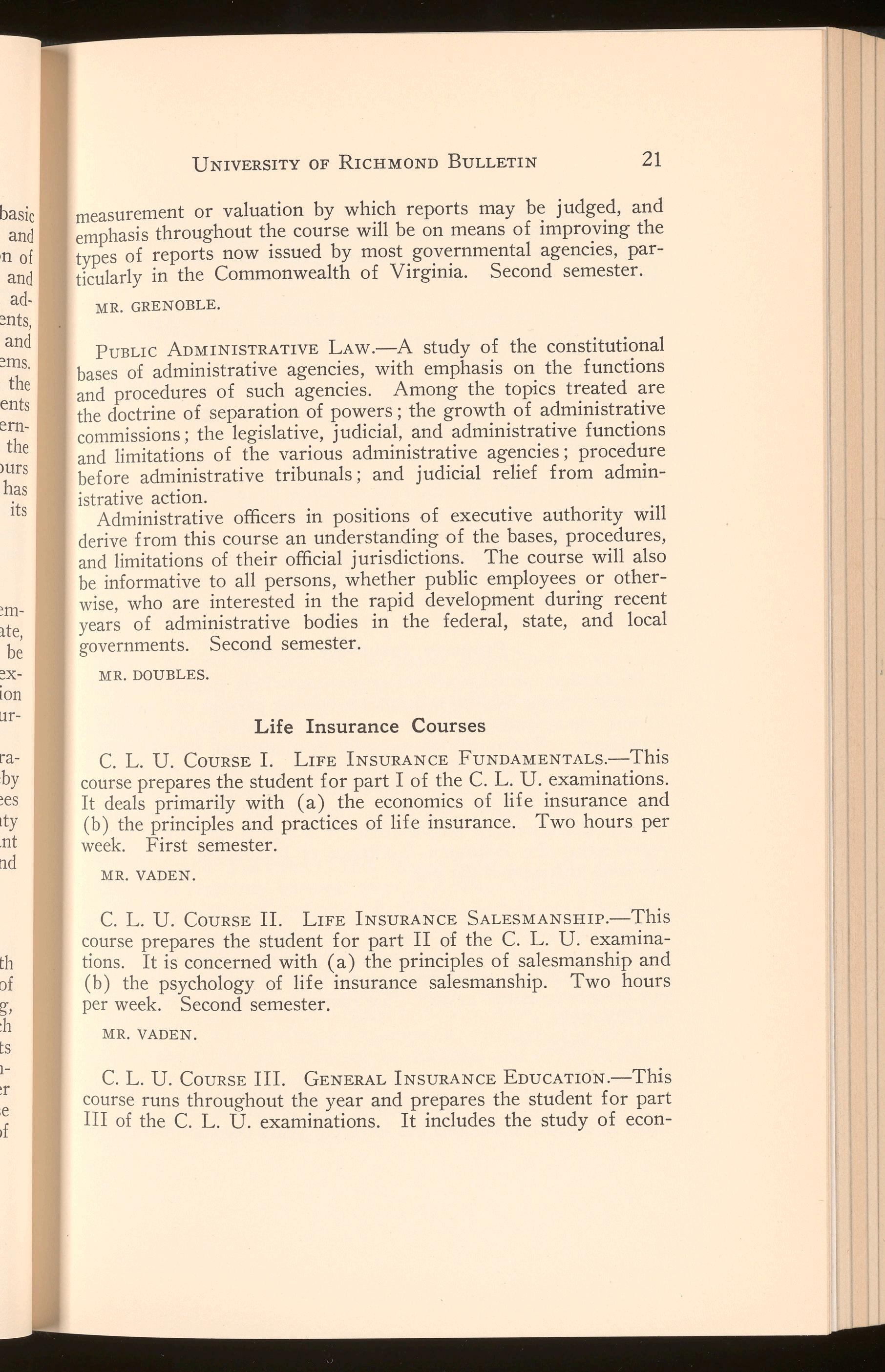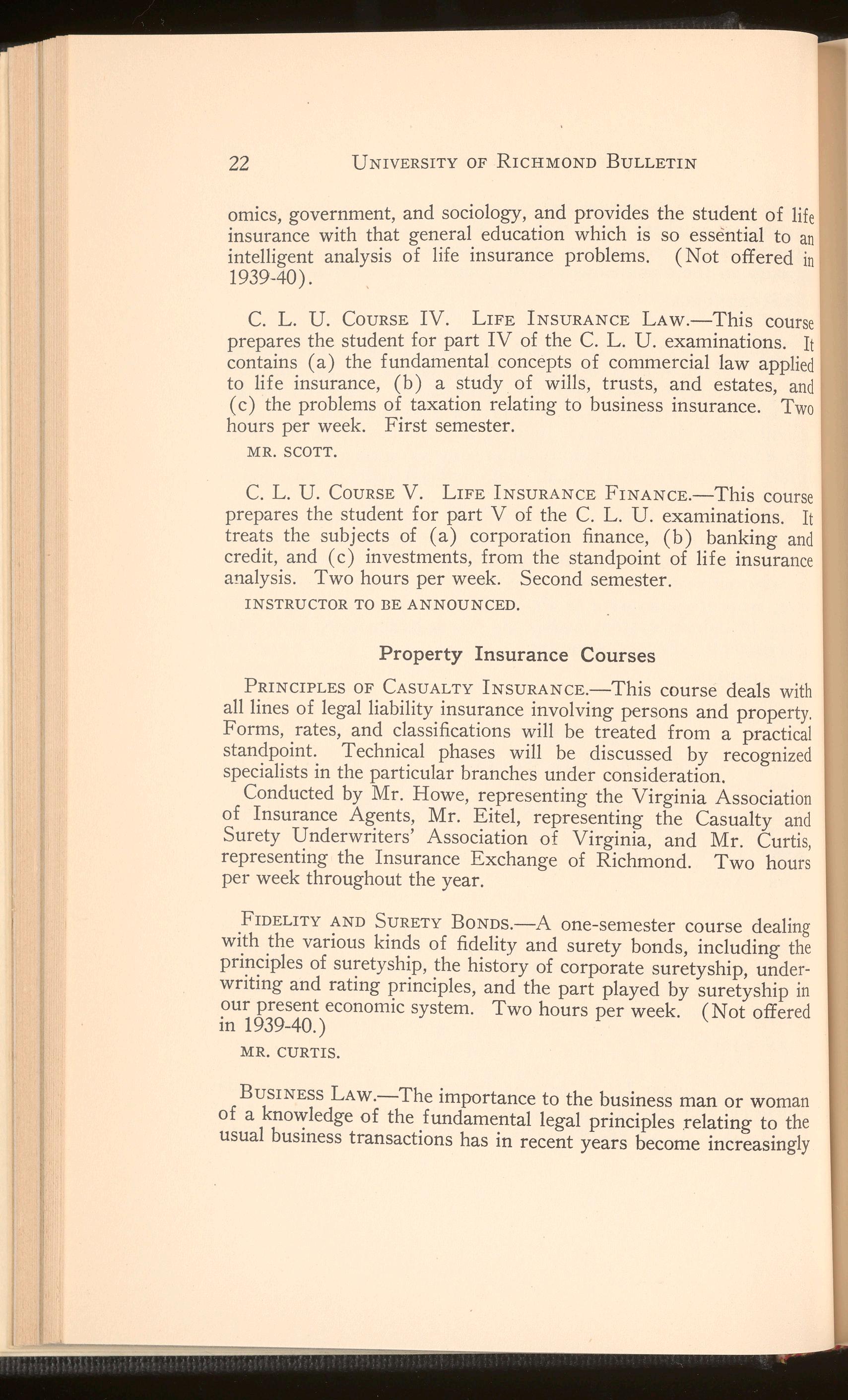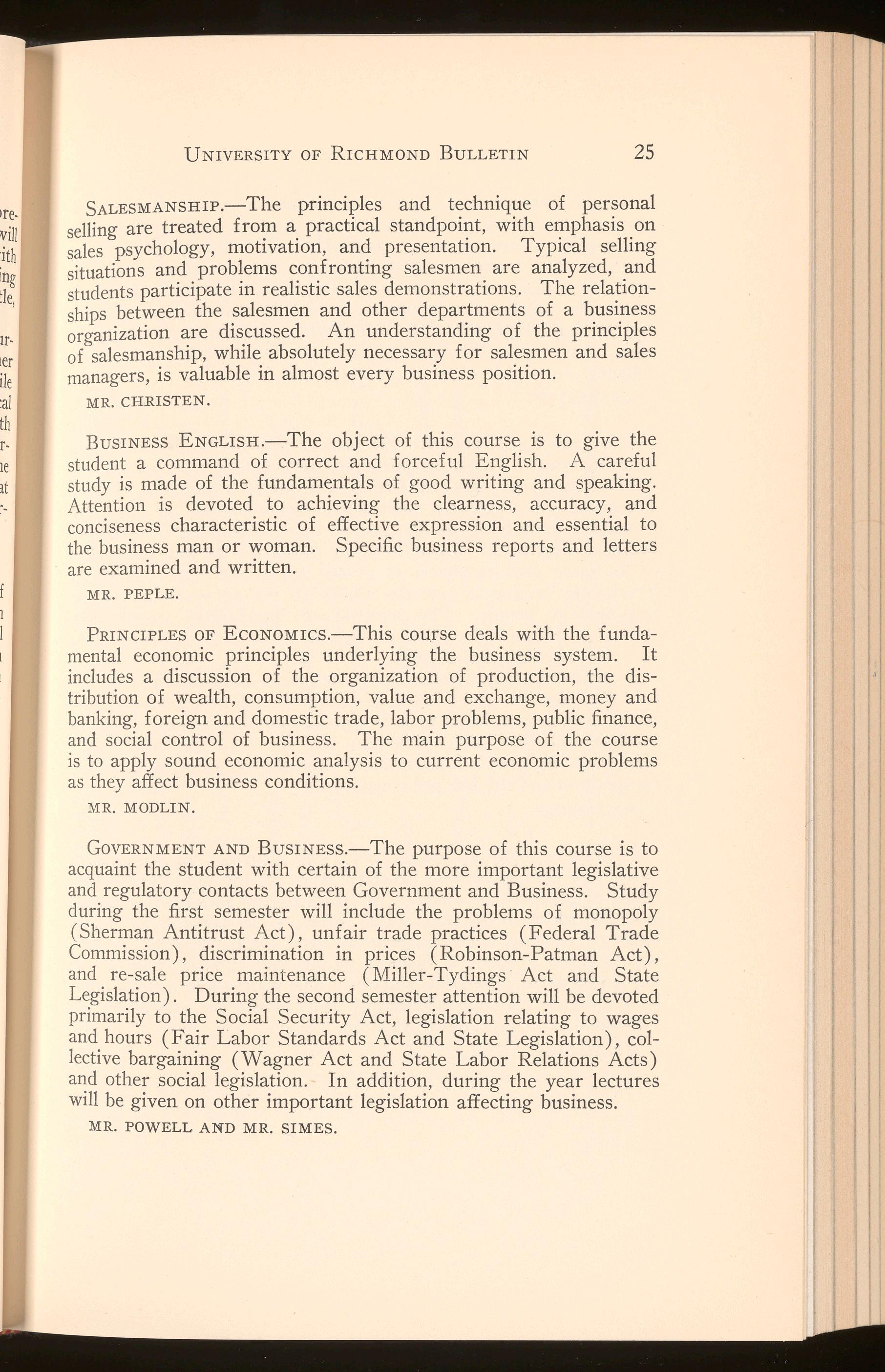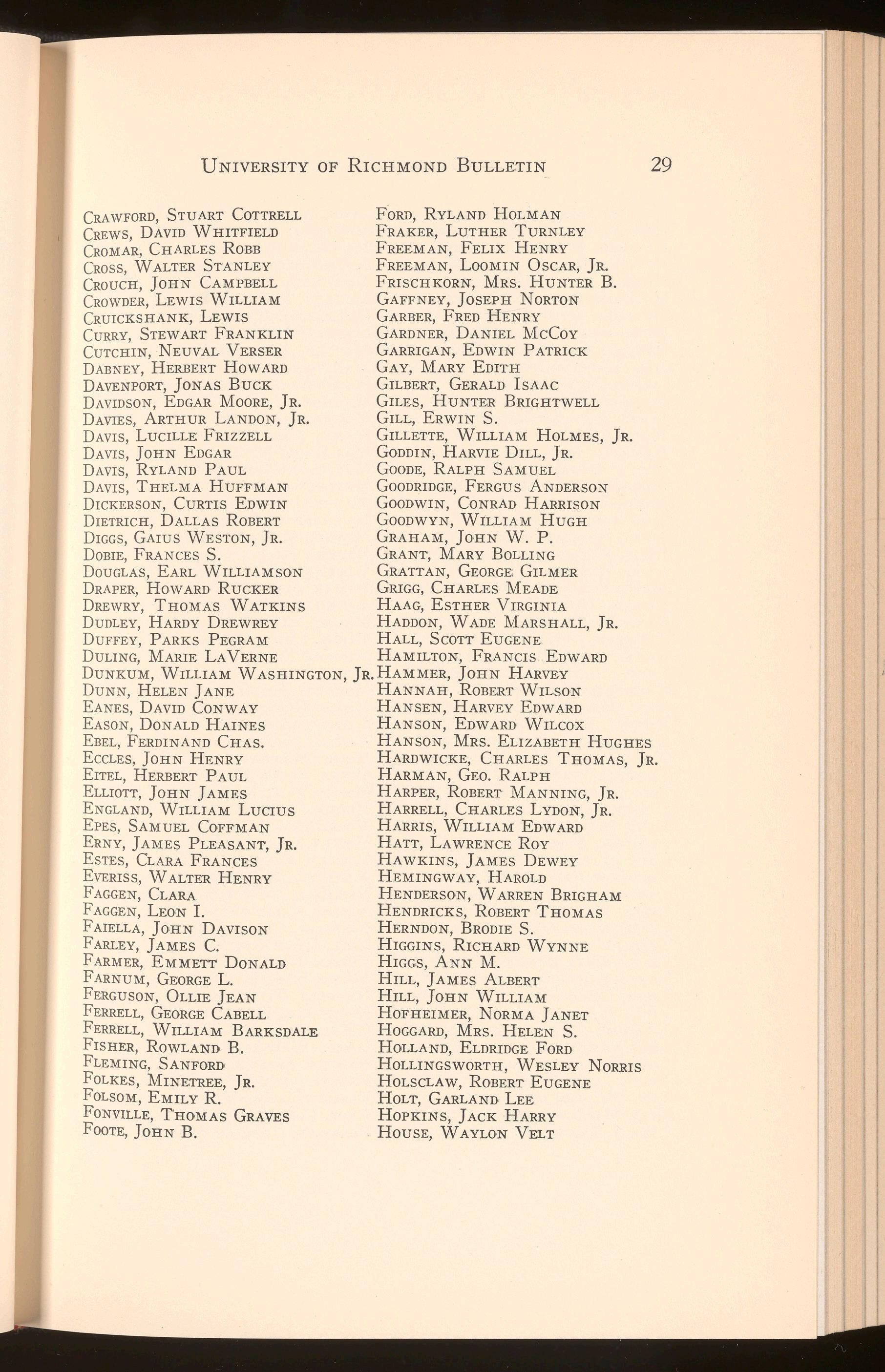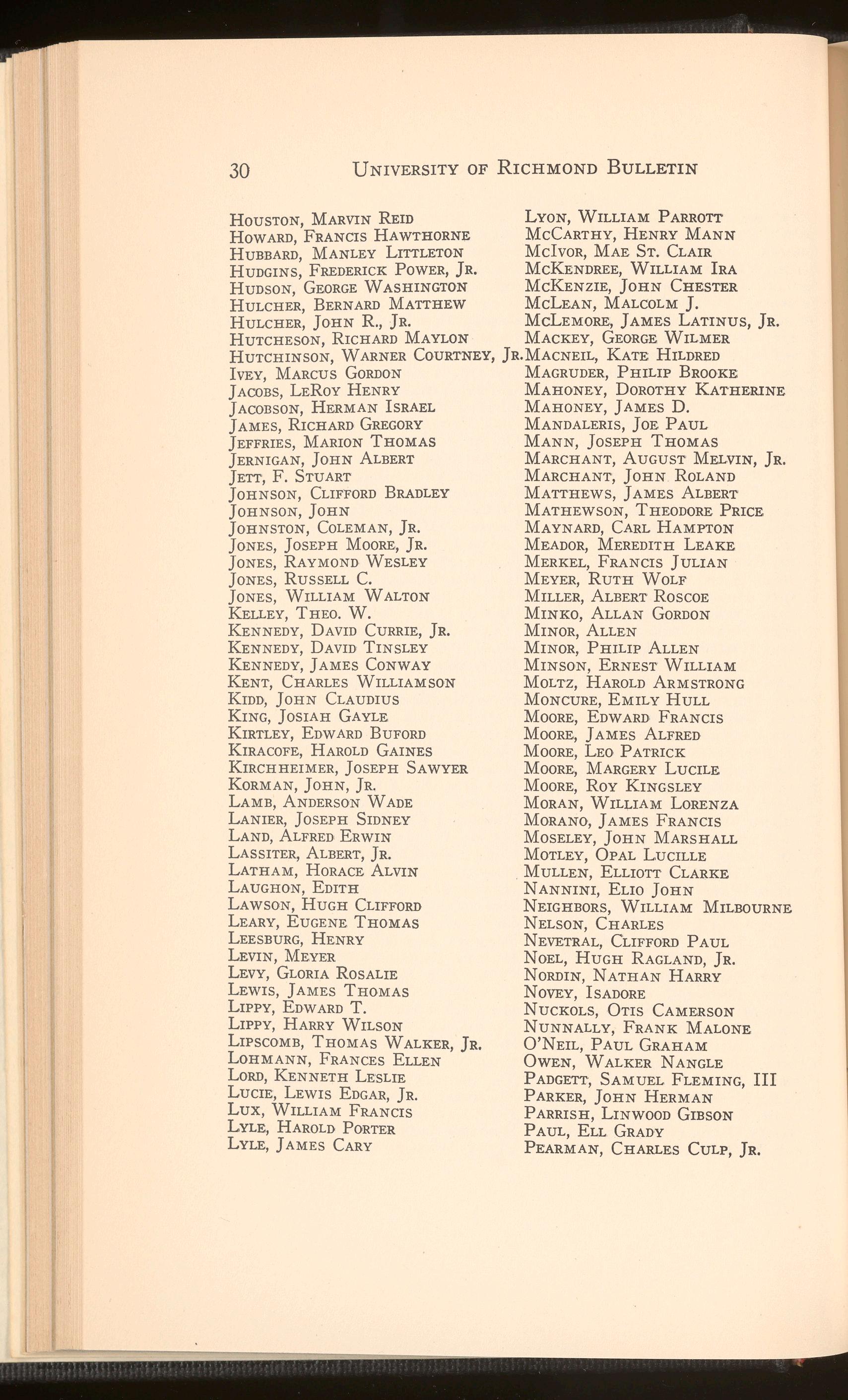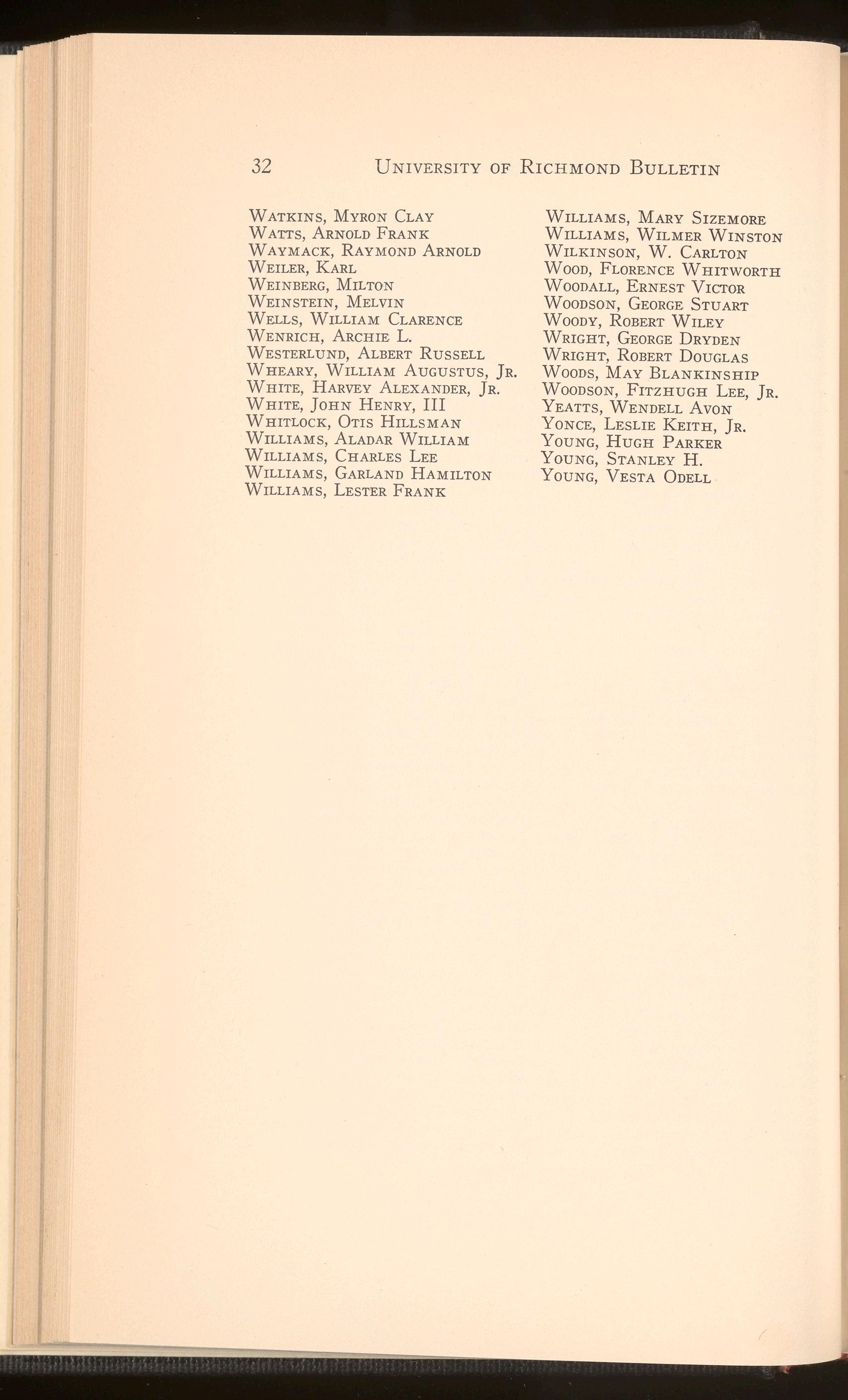The Evening School of Business Administration of the University of Richmond
WITH ANNOUNCEMENTS FOR 1939-1940
Registration, Monday through Friday, September 11-15 , 7: 30-9 :00
Classes begin Monday, September 18, at 7:30 P. M.
All classes meet in Columbia Bitilding-Lombardy and Grace Streets
FOR INFORMATION, ADDRESS
GEORGE M. MODLIN, Director
601 North Lombardy Street Richmond, Va.
BOARD oj COUNSELORS +
T. COLEMAN ANDREWS
NORMAN CALL
DOUGLAS S. FREEMAN
JACK G. HOLTZCLAW
J. AMBLER JOHNSTON
T JUSTIN MOORE
c. H. MORRISSETT
WILLIAM H. STAUFFER
MORTON G. THALHIMER
WILLIAM B. THALHIMER
BRADFORD H. WALKER
CHARLES H. WEBER
JOHN J. WICKER, JR.
CALENDAR
1939-1940
FIRST SEMESTER
SEPTEMBER11-15, MONDAY THROUGH FRIDAY-Registration and payment of fees, 7 :30-9 :00.
SEPTEMBER18, MoNDAY-Classes begin during this week.
NovEMBER30 AND DECEMBER1, THURSDAY AND FRIDAY-Classes suspended, Thanksgiving holidays.
DECEMBER20, WEDNESDAY-Christmas holidays begin.
JANUARY3, WEDNESDAY-Classes resume.
JANUARY29', MONDAY-Semester examinations begin.
FEBRUARY3, SATURDAY-Close of first semester.
SECOND SEMESTER
FEBRUARY5, MONDAY-Second semester classes begin during this week, 8 :00; registration and payment of fees, 7 :00-8 :00.
MARCH22 AND 25, FRIDAY AND MONDAY-Classes suspended, Easter holidays.
MAY 27, MONDAY-Semester examinations begin.
JUNE 1, SATURDAY-Close of second semester.
THE University of Richmond is the outgrowth of the original Richmond College, which was founded in 1832 and chartered in 1840. Prior to 1914, Richmond College was located at the intersection of Grace and Lombardy Streets within the city of Richmond, Virginia. In that year it was removed to the beautiful suburban site it now occupies in Westhampton close to the city.
The University of Richmond, chartered in 1921, now includes as integral divisions the Richmond College ( founded 1832) ; the T. C. Williams School of Law ( organized 1870); Westhampton College, a college of liberal arts and sciences for women (1914) ; the Summer School ( 1920) ; the Graduate Department ( 1921) ; and the Evening School of Business Administration ( 1924).
ADMINISTRATIVE OFFICERS
FREDERICK WILLIAM BOATWRIGHT, M.A., LL.D. PRESIDENT
BENJAMIN WEST TABB, B.A. VICE-PRESIDENT AND TREASURER
GEORGE M. MODLIN, PH.D. DIRECTOR
FRANCES FARMER, B.A., LL.B. SECRETARY
FACULTY oj INSTRUCTION
R. C. AsTROP, M.A.
Professor of Psychology, University of Richmond, Va.
E. T. BASS, C.P.A.
Psychology
Accounting
Member of the firm of A. M. Pullen & Co., Certified Public Accountants, Richmond, Va.
HAROLD I. BAUMES, B.A.
Financial Administration
Assistant Director, Municipal Reference Bureau, League of Virginia Municipalities; formerly Acting Secretary, Capitol Budget Commission, Schenectady, N. Y.
J. GORDON BENNETT
Assistant Auditor of Public Accounts, Commonwealth of Virginia. Accounting
SHERLOCK BRONSON, LL.B.
Corporation Finance
Member of the firm of Tucker, Bronson, Satterfield & Mays, Attorneys at Law, Richmond, Va.
LESTER H. CHRISTEN, B.S.
Sales Manager, Virginia Steel Company, Richmond, Va.
WILLIAM S. CuDLIPP, JR., LL.B.
Salesmanship
Business Law
Practicing Attorney at Law; Associate Professor of Law, T. C. Williams Law School, Richmond, Va.
WARREN F. CURTIS
Property Insurance
Member of the firm of Boswell & Curtis, Richmond, Va.; member of State Bar Association.
M. RAY DOUBLES, B.S., LLB., J.D. Administrative Law Dean, T. C. Williams School of Law, Richmond, Va.
CHAS. C. DRUMMOND Accounting Chief Accountant, Virginia State Corporation Commission.
HERBERT P. EITEL Property Insurance Superintendent, Casualty Department, Fidelity and Casualty Co. of New York, Richmond, Va.
WILLIAM L GRENOBLE, B.A., M.A. Public Administration Statistical Assistant to the Virginia State Comptroller; formerly Researc h Assistant, Virginia State Chamber of Commerce.
RAYMOND C. HALL Advertising Sales and Advertising Department, Richmond Dairy Co., Richmond, Va.
RoLVIX HARLAN, PH.D. Sociology Professor of Sociology, University of Richmond, Va.
LS. HERRINK, B.A., LLB. Law of Real and Personal Property Practicing Attorney at Law; Associate Professor of Law, T. C. Williams Law School, Richmond, Va.
HERBERT R. HILL, C.LU.
In.w,rance District Manager, Life Insurance Company of Virginia; formerly President , Richmond Life Underwriters Association, Richmond, Va.
RALPH W. HowE Property Insurance Vice-President, Davenport Insurance Company, Richmond, Va.
ARTHUR N. KEMP, C.P.A.
Accounting Member of the staff of Elkins & Durham, Certified Public Accountants, Rich• mond, Va.
AUBREY KrnD, B.S., C.P.A. Auditor, The Morris Plan Bank of Virginia.
w. EARLE MINTON, B.A. Larus and Brother Company, Richmond, Va.
GEORGE M. MoDLIN, Pu.D.
Accounting
Advertising
Economics Formerly Assistant Professor of Economics, Princeton University, and Lecturer in Finance, Rutgers University.
W. F. PAYNE, B.S., C.P.A.
Accounti ng
aff of T. Coleman Andrews & Co., Certified Public Accountants,
ance
e Bar Law ting
EDWARD C. PEPLE, PH.D.
Business English
Assistant Professor of Engli~h, University of Ri_chmond? Va . ; formerly Assistant in English, Harvard Umvers1ty, and Instructor m English, Wells College, N. Y.
RA YMOND B. PINCHBECK, PH.D.
Public Administration
Dean, Richmond College, University of Richmond, Va.
LEW IS F. POWELL, JR., B.S., LL.B., LL.M.
Government and Business
Member of the firm of Hunton, Williams, Anderson, Gay & Moore, Attorneys at L aw, Richmond, Va.; formerly Assistant in Business Law, Washington and Lee U niversity
J. GA RLAND ROWLETT, C.P.A.
lion M ember of the staff of Virginia State Auditor of Public Accounts. earch
BEN A. RUFFIN
·ing
rty Law
.ent, ng ich-
Accounting
Public Speaking
Lecturer and Speaker; member of the staff of the Richmond Chamber of Commerce, Richmond, Va
INE Z KJELLSTROM RUSSELL, LL.B
Retail Merchandising
Gr adu ate of Prince School of Education for Store Service, Boston, Mass.; for• merly Store Manager, Thalhimer Brothers, Richmond, Va.
A. B ScoTT, B.A., LL.B.
Life Insurance Law
Coun sel, Atlantic Life Insurance Co., Richmond, Va.; formerly Assistant Pro• fesso r of Law, University of Virginia.
STEP HEN H. SIMES, A.B., LL.B.
Government and Business Ass ociated with the firm of Hunton, Williams, Anderson, Gay & Moore, Attorneys at Law, Richmond, Va
HERM AN P. THOMAS, PH.D.
Asso ciate Professor of Economics, University of Richmond, Va.
JOHN 0 . TOBLER, PH.D.
Finance
Public Administration
Assis tant Professor of Government, University of Richmond, Va.
H. w . VADEN, B.S.
Life Insurance
S tate M a nager, The Guardian Life Insurance Company of America; formerly D1rect or of Mathew Whaley Training School for Teachers, College of William and Mary.
C. B. WRAY, B.B.S., M B.A., C.P.A.
Pr ofessor of Accounting, University of Richmond, Va.
0. E. ZACHARIAS, JR., C.P A.
Comptroller , Southern States Cooperative, Inc., Richmond, Va.
Accounting
Accounting
UNIVERSITY OF RICHMOND
EVENING SCHOOL oj BUSINESS ADMINISTRATION
Training for business exclusively in the school of expe rienc e, it is now clear, is a wastefully long process. It is generally agreed that by bringing together in systematic form the experience of many years, many men, and many businesses, a university course of instruction in business enables the individual to profit by the combined experience of others and thus to advance more rapidly. It is by shortening the period of apprenticeship, together with the giving of a broader and more thorough knowledge of the business field in general, that the university schools of business have made for themselves a secure place in the scheme of modern education. Recognizing the importance of this phase of practical education, the University of Richmond, in 1924, established the Evening School of Business Administration as the sixth division of the University. Since its establishment the Evening School of Busi- ness has enjoyed a steady growth from an original enro llment of 51 students. The purpose of the Evening School of Business is to provide an opportunity for industrial and governmental employees to continue their educational training while working and to obtain both a broad knowledge of the fundamentals of business and a more specialized training in the techniques of particular vocations.
FACULTY
Instruction by Business Men and Professional Teachers
Two groups are represented in the faculty of the Evening School of Business: the professional university instructor who is devoting his life to education as a career, and the active business executive or government official who has achieved success in his vocation and :Vho is willing to conduct a college course in the field of his major interest. Most of the business men who are affiliated with the School's faculty have had former teaching experience. Through these two groups, each with its special emphasis, there results a balanced education which gives due weight to both the theoretical and the practical.
To supplement th~ instruction offered by members of the regular faculty of the Evening School of Business Administration a number of prominent business executives and government officials in
nee, ·eed : of 1rse the dly. the 1ess ade IOU. ton, ing the lSI· of ; to ees am ore ool .ng ive nd ior he gh , a :al ar TI· in
UNIVERSITY OF RICHMOND BULLETIN
Richmond have generously agreed to meet with various classes and give to the students the benefit of their specialized knowledge and experience.
ADMISSION REQUIREMENTS
Four classifications of students, both men and women, are admitted into the Evening School of Business Administration:
( 1) Special students. Adults over twenty-one years of age who are not high school graduates may be admitted as special students.
(2) High school graduates. Young men and women who have graduated from high school with at least fifteen approved units are eligible to enter.
( 3) Present or former college students. To those young people who have attended college a year or more without graduating, the Evening School of Business offe.rs an opportunity to continue their university training while being employed. Courses are also elected for credit by undergraduates now attending other divisions of the University, especially in Richmond College and the T. C. Williams School of Law.
( 4) Callege grad'uates. Many students enrolled in the Evening School of Business are college and university graduates. Graduates of literary colleges who wish to extend their general, cultural education, graduates of engineering colleges who wish to supplement their technical knowledge, and graduates of university schools of commerce who wish to specialize further in particular fields of activity have found benefit in the training provided.
PROGRAMS OF STUDY
Degree Program-Work done in the Evening School of Business Administration is of full college grade, and credit for courses is accepted toward a degree in the University of Richmond or other colleges and universities. To receive college credit a student must meet the college requirements for entrance, must attend classes regularly, and must pass the examination at the end of the semester. For every course passed each semester, two semester-hours credit is given. At the present time enough courses are offered to provide approximately one hundred semester-hours credit, and students in the Evening School of Business are encouraged to fulfill the requirements for regular college degrees.
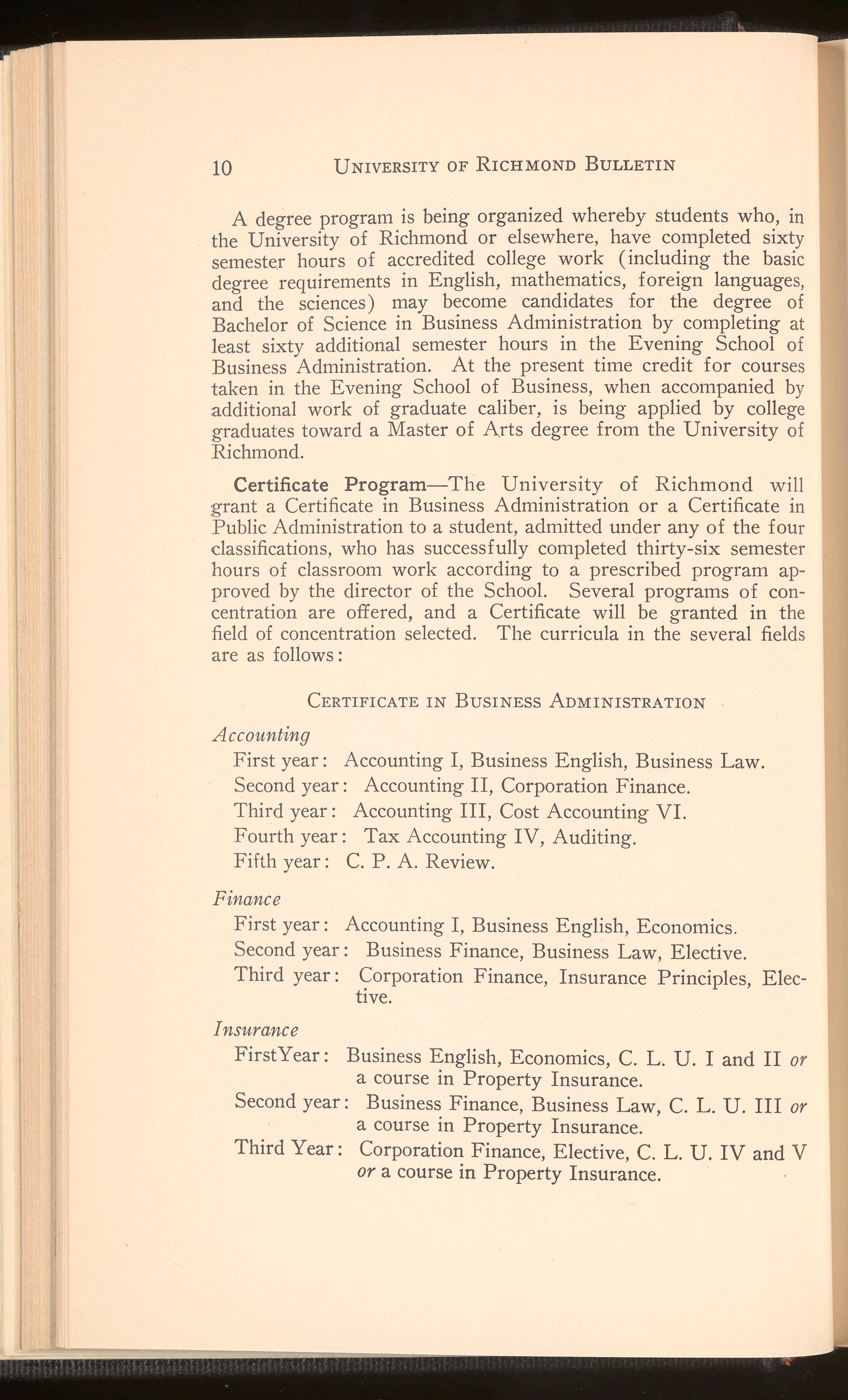
A degree program is being organized whereby students who, in the University of Richmond or elsewhere, have completed sixty semester hours of accredited college work ( including the basic degree requirements in English, mathe!71atics, foreign languages, and the sciences) may become candidates for the degree of Bachelor of Science in Business Administration by completing at least sixty additional semester hours in the Evening School of Business Administration. At the present time credit for courses taken in the Evening School of Business, when accompanied by additional work of graduate caliber, is being applied by college graduates toward a Master of Arts degree from the University of Richmond.
Certificate Program-The University of Richmond will g rant a Certificate in Business Administration or a Certificate in Public Administration to a student, admitted under any of the four classifications , who has successfully completed thirty-six semester hours of classroom work according to a prescribed program approved by the director of the School. Several programs of concentration are offered, and a Certificate will be granted in the field of concentration selected. The curricula in the several fields are as follows :
CERTIFICATE IN BUSINESS ADMINISTRATION
Accounting
First year: Accounting I, Business English, Business Law.
Second year: Accounting II, Corporation Finance.
Third year: Accounting III, Cost Accounting VI.
Fourth year: Tax Accounting IV, Auditing
Fifth year: C. P. A. Review.
Finance
First year: Accounting I, Business English, Economics.
Second year: Business Finance, Business Law, Elective.
Third year: <;:orporation Finance, Insurance Principles, Elective.
Insurance
First Year: Business English, Economics, C. L. U. I and II or a course in Property Insurance.
Second year: Business Finance, Business Law, C. L. U. III or a course in Property Insurance.
Third Year: Corporation Finance, Elective, C . L. U. IV and V or a course in Property Insurance.
UNIVERSITY OF RICHMOND BULLETIN 11
M erchand'ising
First year: Business English, Business Psychology, Store Management.
Second year: Accounting I , Economics, Salesmanship .
Third year: Advertising, Business Law, Elective.
CERTIFICATE IN PUBLIC ADMINISTRATION
F irst year: Principles of Public Administration, Accounting I, Business English, Electives to complete 12 semester hours.
Second year: Public Financial Administration , Governmental Accounting VII, Economics, Electives to complete 12 semester hours.
Third year: Public Reporting, Administrative Law, Electives to complete 12 semester hours.
A general curriculum in Business Administration may be composed of Business English, Business Law, Economics, Accounting I, and El ectives to complete thirty-six semester hours. Electives in any program may be chosen from other courses in the catalogue, subj ect to the approval of the director. Although a specific num- ber of years is designated for a Certificate, the required work may be completed in a different sequence and in more or less time, depending upon the abilities and circumstances of the student
Individual-Course Program-Many persons desire to enroll in individual courses for vocational or cultural value without rega rd to college credits or a certificate curriculum. Unless special tra ining or prerequisite courses are necessary, all courses announced in this catalo g ue may be elected on an individual basis by students admitt ed under any of the four classifications.
A ny student following either of the three programs of study may carry one or more classes, according to his or her wishes and ability. Although it is possible to carry as many as five classes each semester , such a schedule would load a student to capacity and is recommended only to the most earnest and capable students. By doing so, however, a student can obtain twenty semester-hours credit each session.
SPECIALIZED TRAINING
The Evening School of Business has been established to provide the typ es of business training of college caliber required by those persons in Richmond and vicinity unable to devote their full time
UNIVERSITY OF RICHMOND BULLETIN
to study. In seeking to a~hieve this end the School h~s obtained the advice of civic and busmess leaders of the commymty _and has sought to cooperate with organizations of loca~ business mte~e~ts and governmental agencies in ~ffering educat10nal opportumti~s required by members of the various groups. The present c?rnculum of the School, in addition to courses for general busm~ss training, provides specialized programs of study for prospective students of law, for students of accountancy, for governmental employees, for insurance men, merchants, realtors, and others.
Pre-Law
Study-Credit
earned by regular students in classes in the Evening School of Business Administration is accepted in fulfillment of requirements for entrance as a student in the Law School. A minimum of sixty semester hours of credit, completed with an average grade of "C", is required for admission to the Law School, and a student may satisfy this requirement most quickly in the Evening School by carrying five classes a week for three years. Pre-law students should confer with the director to arrange an approved schedule of classes.
The laws of the State of Virginia require that applicants for admission to the bar shall have had (a) two years of college work ( sixty semester hours) or its equivalent, and (b) two years of law study in an accredited law school, or its equivalent. Law School classes are conducted exclusively in the morning hours.
In-Service Training for Governmental Employees-There
are in Richmond over five thousand employees of federal, state, and municipal government agencies, and the Evening School of Business Administration has established a program of courses that will provide an opportunity for public employees to obtain further education in the fields of their employment. The courses will be taught by qualified experts in the various fields, and the subjects will be presented in a thoroughly practical, realistic manner. The program is designed, on the one hand, to provide an understanding o_fthe fundamental principles and techniques of public administration and, on the other hand, to afford specialized training in specific fields which will increase the efficiency of the employee in his job. Such in-ser':ice training is being increasingly recognized by government agencies throughout the country as of inestimable value in raising the standards of public employment.
D?r_ing t~is year c?urses will be offered in principles of public admm1s~ratton, public financial administration, governmental accounting, public reporting, and administrative law. Other cou:ses will be organized as demand warrants. In addition, certain basic course~ in business administration, such as English, economics, and accountmg, may be elected with profit by public employees.
1ed 1as ,sts :ies ·ness ive ta! Ill is ,nt .it, )ll 1st or to )r :k w ol Q~, )f Lt ,r e s e C
UNIVERSITY OF RICHMOND BULLETIN 13
Training for C. P. A. Examinations-The accounting courses offered in the Evening School of Business, if successfully passed by a regular student, are accepted in fulfillment of the educational requirements of candidates taking the annual Virginia examinations for the certificate of Certified Public Accountant. The Business Law course also prepares candidates for the law division of the examination, and a special C. P. A. Review course, to be taken after the other courses are completed, is offered for students preparing for the examinations.
The laws of the State of Virginia require, among other things, that candidates for the certificate of Certified Public Accountant (a) shall be high school graduates, or the equivalent, (b) shall have had two years of practical experience or have completed an accounting course in a qualified school, and ( c) shall have passed a satisfactory examination in the following subjects: ( 1) theory of accounts, (2) practical accounting, ( 3) auditing, ( 4) commercial law as affecting accounting, and ( 5) other related subjects, within the discretion of the State Board of Accountancy. Examinations are held by the State Board in Richmond in November of each year. For further information confer with the director of the Evening School of Business or write the Secretary-Treasurer, State Board of Accountancy, 506 State-Planters Bank Building, Richmond.
Training for C. L. U. Examinations-In cooperation with the Richmond chapter of Chartered Life Underwriters, the Evening School of Business offers a program of courses designed by the American College of Life Underwriters to prepare qualified candidates for the C. L. U. examinations. Although provided primarily for members of the life insurance profession who are seeking the degree of Chartered Life Underwriter, these courses are open to others who desire this intensive and valuable educational training in the field of life insurance.
The American College of Life Underwriters awards the degree of C. L. U. to properly qualified candidates who successfully pass the following series of examinations: ( 1) life insurance fundamentals, (2) life insurance salesmanship, (3) general insurance education, ( 4) insurance law , and ( 5) insurance finance. The examinations in these subjects are prepared and graded by the Examining Board of the American College of Life Underwriters, and the Evening School of Business merely supervises the exam!nations in June of each year. The examinations may be taken in 1~stallments at the option of the candidate. For further information consult the description of the courses and confer with the director.
UNIVERSITY OF RICHMOND BULLETIN
Property Insurance Program-A program of courses in the field of property insurance is being organized by the Evening School of Business in collaboration with, and under the sponsor- ship of, the Insurance Exchange of Richmond, the Casualty and Surety Underwriters' Association of Virginia, and the Virginia Association of Insurance Agents. Courses will be offered in the various lines of property insurance, including casualty, surety and fidelity bonds, fire, marine and inland marine, and others. Al- though designed primarily for insurance agents, solicitors, and office staffs, these courses will prove valuable to undergraduates and others who contemplate entering this profession and also to business men who purchase the different types of insurance.
GENERAL INFORMATION
Class Hours-Classes meet once each week, beginning at 7 :30 P. M. and continuing for 100 minutes, unless stipulated other- wise in the description of particular courses.
Fees-Tuition fees are payable each semester in advance. Students are expected to pay all fees at the time of registration or before attending the fir st meeting of the classes for which they have enrolled. The fee for each course taken is $12.50 per semester, or $25.00 for the full year course.
Grading-The standing of students is indicated as follow s : A (95-100%) excellent work; B ( 86-94%) very good work; C (80-85%) fair or average work; D (75-79%) just passing; E ( 65-7 4%) unsatisfactory work, incurring a condition which may be removed through a re-examination; F (below 65%) a failure, without the right to a re-examination; I, incomplete because of excused absence from final examination or because of failure to submit required work during the semester; N, no credit because of excessive or unexcused absences.
Removal of Conditions-A student who receives a grade of E, thereby incurring a condition in a semester's work, may remove the condition and obtain credit for the course ( 1) by repeating the course successfully the following year, (2) by taking the regular examination in the course the following year and making a sufficiently high mark to raise the original term grade to D, or (3) by taking a special re-examination and making a suffi- ciently high mark to raise his grade to D. Special re-examinations will be given on specified dates in March and September, upon authorization of the director and upon the payment of a fee of one dollar. A student is permitted only one re-examination on any
he ng )rnd 1Ia he nd \.Ind tes to at :r:e. or ey 1er s: k; E ay re, of to :se :le ay by 1g 1d to fins )n t1e 1y
UNIVERSITY OF RICHMOND BULLETIN 15
condition, and if he is unsuccessful the condition is converted into a failure.
A student who receives a grade of I may obtain credit for the course ( 1) by taking the regular examination in the course the following year ( 2) by taking a special re-examination to be given on specified dates in_March and September, upon authorizatjon of the director and without the payment of a fee, or ( 3) m the instance of incompleted class work, by submitting the required work immediately after the close of the semester.
A student who receives a grade of F or N must repeat the course successfully to obtain credit.
Absences-No credit can be given for a course if, during a semester, the student has more than four absences, whether excused or unexcused and including those caused by entering the course late, unless the instructor indicates in writing to the director that he believes the student is sufficiently qualified to be allowed credit for the course. Unexcused absences should result in an appropriate lowering of the student's grade, to be determined by the instructor. The grounds for excusing absences are ( 1) illness, (2) a personal obligation recognized as valid by the instructor, and ( 3) religious holidays.
Honors and Scholarships-Five scholarships will be awarded in June, 1940, by the Board of Trustees of the University of Richmond to those students with the best scholastic record in the following five classes: Accounting I, Business English, Business Law, Economics, and Public Speaking. These scholarships will be awarded on the basis of academic records, determined by the director with the advice of the faculty. Each scholarship will entitle the recipient to free tuition in any one course taken in the Evening School of Business during the session of 1940-41.
The T. Coleman Andrews & Company prize of twenty-five dollars, established by the company whose name it bears, will be awarded to the student in any of the advanced classes in accounting who is deemed by the director and the faculty to be best equipped by character, personality, intellectual capacity, and broad educational training to succeed in the profession of accountancy.
Library-Students in the Evening School of Business Ad~i1:i~tration are given access to the facilities of the library of this d1V1s10nof the University of Richmond and to the library facilities of o~her divisions of the University. A large reading room and a specialized library dealing with economic subjects and current business affairs are maintained especially for the use of students of the Evening School of Business. Students are encouraged to
broaden the scope of their training by the use of current periodical and pamphlet material made available in the School library.
Vocational Counseling and Placement of Students-To help students find the vocation for which they are best suited, members of the staff of the University of Richmond will conduct vocational aptitude tests which may be taken by students registered in the Evening School of Business. The results of these scientific tests, combined with individual discussions with students, will be used as the basis for giving students who desire advice all possible assistance in determining the field of business they may wish to enter and for which they may be fitted.
Although no promise is made by the School of Business to secure positions for its students, an effort is made to find places for those who inform the School authorities of their desire to obtain new positions and who have made a good record in the School. Gratifying success has attended the efforts to aid capable students in making connections with business firms.
Student Activities-Students of the Evening School of Business Administration are students of the University of Richmond. The traditions of the other colleges of the University are well known in the city. Tradition is also present in the spirit of the personnel of this college, and it is the policy of the administration and faculty to foster any proper organizations and activities that the students should undertake .
Location-The Evening School of Business Administration is located in the Columbia Building at 601 North Lombardy Street, at the corner of West Grace Street.
ical elp iers >nal the sts, sed ible to to ces to the ble of ~htre of ~a1es )n et,
UNIVERSITYOF RICHMOND BULLETIN
COURSES oj STUDY
For 1939-1940
The right is reserved to withdraw courses in which the enrollment is less than fifteen.
Accounting Courses
AccouNTING I. FuNDAMENTALSOF AccouNTING.-This course provides an introduction to the science of accounting ( 1) for those who intend to prepare themselves for accountancy as a profession, (2) for those seeking a general foundation in the various fields of business administration, ( 3) for those desiring the elements of accounting applicable in the practice of law, and ( 4) for those employed in the financial departments of governmental agencies. The study, though suited to the needs of beginners, advances rapidly through the principles of debit and credit and other routine of double entry bookkeeping to the construction from the trial balance of the balance sheet and the statement of profit and loss. Interpretation of balance sheets and income statements of the sole proprietorship, the partnership, and the corporation will receive attention. Two hours per week throughout the year. ( Sections A and B begin in the first semester, while Section C, which begins in the second semester of each preceding year, concludes in the first semester.)
MR. KEMP AND MR. PAYNE.
AccouNTING II. INTERMEDIATEAccouNTING.-To enter this course a student must have completed an introductory course in the science of accounting. The study of accounting for the corporate form of organization, begun in elementary accounting, is continued with the accounting procedure applicable to the manufacturing type of business. The voucher system and the selfbalancing factory ledger will be studied. Balance sheets and income statements will be made comparative; the statement of application of funds and the statement showing the causes of variation in net profit as between years will be introduced. Two hours per week throughout the year.
MR. ZACHARIAS.
AccouNTING III. ADVANCEDAccouNTING.-This course is intended primarily to meet the requirements of students who expect to enter the accounting profession. To enroll for this course
UNIVERSITY OF RICHMOND BULLETIN
students must first have completed Fundamentals of Accounting and Intermediate Accounting. This course covers many of the major subjects of higher accou~ting, with s~eci~l emphasis given to partnership and estate accountmg, to consohdat10ns and mergers , and to the rendition of consolidated balance sheets and consolidated profit and loss statements; several meetings will be devoted to budgetary and municipal accounting. Two hours per week throu ghout the year.
MR. ROWLETT.
AccouNTING IV. TAX AccouNTING.-The first semester is devoted largely to the consideration of problems facing the accountant in preparing federal income tax reports for clients. The student studies the preparation of income tax returns for individuals, partnerships, and corporations, and is also shown how to solve various problems arising under the income tax laws.
During the second semester detailed treatment is given to all forms required under the Social Security Act, to federal and state inheritance tax reports, and to all other tax reports required by the State of Virginia.
MR. BASS.
AccouNTING V. AuDITING.-This course covers both th e theory and practice of auditing , with the discussion of the text being supplemented with questions, problems, and laboratory practice sets. The student performs an actual audit of a theoretical set of books, preparing working papers and the report thereon. The subject matter covers the auditing procedure involved in connection with both a balance sheet and a detailed audit, with consideration being given to special types of examinations and investigations as well as to the ethics and general conduct of the public accountant.
MR. KIDD.
AccouNTING VI. CosT AccouNTING.-This course will cover methods of accounting for the various elements of production , distribution, and financial cost, with especial emphasis on the use of cost information in the administration and control of the business enterprise. Through the medium of lectures, the study of a text, and the solution of problems, the student is given a thorough knowledge of cost accounting principles and their application to manufacturing, wholesale, and retail establishments.
MR. DRUMMOND.
mting ,f the given ·gers, jated :d to •ugh~r is acThe ndiv to all tate by the ext Jry cal )n. mmnhe er n, ;e 1,f a
UNIVERSITYOF RICHMONDBuLtETIN 19
AccouNTING VII. GovERNMENTALAccouNTING. ( See description of course in public administration.)
MR.BENNETT.
C. P.A. REvrnw.-This is a full-year course designed especially for students who are preparing to take the examinations for the Certificate oi Certified Public Accountant in November, 1940. Instruction consists largely in the analysis of typical questions and problems which have been given in former C. P. A. examinations. There will be weekly assignments of problems and questions to which solutions will be required. The course is primarily an intensive review of the major phases of accounting, including business law and actuarial problems.
Offered in 1939-40 for the first time as a full-year course, classes will meet once a week for a two-hour period, and only those applicants will be accepted who present evidence of sufficient former training. No college credit given.
MR.WRAY.
C. P.A. REVIEWB.-This course is the same as the last half of the above full-year course and is offered principally for the benefit of those students who registered for the C. P. A. Review class in February, 1939, and who are preparing to take the C. P. A. examinations in November, 1939. The review will cover consolidated statements, municipal accounting, auditing, tax problems, and business law. The class will meet twice a week, two hours per meeting, from September through the first week in November. Applicants for this class, in addition to those who registered in February, 1939, will be considered .
MR.WRAYANDOTHERS.
Courses in Public Administration
PRINCIPLES OF PUBLIC ADMINISTRATION.-A general survey course designed to serve as an introduction to the subject and to acquaint public employees with the scope, background, and problems of public administration. It includes the history, organization, structure, functions, and policies of public-service agencies, a treatment of financial and personnel administration, administrative law, records and accounts, and public relations, with a discussion of the relationships between various federal, state, and local governmental units. First semester.
MR.PINCHBECKAND MR. TOBLER.
UNIVERSITYOF RICHMONDBULLETIN
GovERNMENTALAccOUNTING.-This course will cover the basic principles of governmental acco~nting, inch~ding the s_cop~ and purposes of governmental ~c~ountmg; the busmess. or~arnzat10n of government; the characteristics,_ purposes, o~ner_sh1p, mco~es, and management of public corporat10ns; the legislative, executive, administrative and public use of accounts ; the study of documents, records, th~ general ledger, typical transactions, stat~ments, and reports; and the installation of governmental accountmg system s
Among those who will find this course of special benefit are the bookkeepers and accountants in the various financial department s and bureaus of the federal, state, municipal, and county governments. It will also prove valuable to students training for the profession of accountancy. The course will meet for two hour s once a week throughout the year and is open to anyone who has taken the fundamentals of accounting (Accounting I) or its equivalent.
MR.BENNETT.
PUBLIC FINANCIAL ADMINISTRATION.-This course will emphasize the practical aspects of public finance on the federal, state, and local levels of government. Particular attention will be directed to taxation, budgeting, financial control, revenues, expenditures, and current problems of public finance. Consideration will also be given to the assessment and collection of taxes, purchasing, debt, and long-term financial planning.
Various public officials engaged in public financial administration will meet with the class for discussions and lectures , thereb y lending a thoroughly practical approach to the course. Employees in the financial divisions of federal , state, municipal, and county governments, as well as others who are interested in this important field of public administration, will find this course valuable and interesting. First semester.
MR.BAUMES.
REPORTINGANDPUBLICRELATIONS.-This course will deal with the practical problems of public reporting and the preparation of governmental reports, including composition and content, editin g, proofreading and indexing, illustrating, and publication of such reports. ~ttention will be given to the principal types of report s generally issued by governmental units, such as internal administrative reports, periodic departmental reports, and newspaper releases, with a critical study of the purposes served by the se reports. An attempt will be made to formulate standards of
basic and •n of and adents, and ~ms. the ents ernthe JUrs has its :mite, be 1011 urra:by :es 1ty .nt nd th of g, :h ts 1:r :e lf
UNIVERSITY OF RICHMOND BULLETIN 21
measurement or valuation by which reports may be judged, and emphasis throughout the course will be on means of improving the types of reports now issued by most governmental agencies, particularly in the Commonwealth of Virginia. Second semester.
MR.GRENOBLE.
PuBLIC ADMINISTRATIVELAw.-A study of the constitutional bases of administrative agencies, with emphasis on the functions and procedures of such agencies. Among the topics treated are the doctrine of separation of powers ; the growth of administrative commissions; the legislative, judicial, and administrative functions and limitations of the various administrative agencies; procedure before administrative tribunals; and judicial relief from administrative action.
Administrative officers in positions of executive authority will derive from this course an understanding of the bases, procedures, and limitations of their official jurisdictions The course will also be informative to all persons, whether public employees or otherwise, who are interested in the rapid development during recent years of administrative bodies in the federal, state, and local governments. Second semester.
MR.DOUBLES.
Life Insurance Courses
C. L. U. CouRsE I. LIFE INSURANCE FuNDAMENTALS.-This course prepares the student for part I of the C. L. U. examinations. It deals primarily with (a) the economics of life insurance and (b) the principles and practices of life insurance. Two hours per week. First semester.
MR.VADEN.
C. L. U. CouRsE II. LIFE INSURANCE SALESMANSHIP.-This course prepares the student for part II of the C. L. U. examinations. It is concerned with (a) the principles of salesmanship and (b) the psychology of life insurance salesmanship. Two hours per week. Second semester.
MR.VADEN.
C. L. U. CouRsE III. GENERALINSURANCEEDUCATION.-This course runs throughout the year and prepares the student for part III of the C. L. U. examinations. It includes the study of econ-
UNIVERSITYOF RICHMONDBULLETIN
omics, government, and sociology, ~nd pro_vid~s the stu~e~t of life insurance with that general educat10n which 1s so essential to an intelligent analysis of life insurance problems. (Not offered in 1939-40).
C. L. U. CouRSE IV. LIFE INSURANCELAw.-This course prepares the student for part IV of the C. L. U. ex~minations. It contains (a) the fundamental concepts of commercial law applied to life insurance, (b) a study of wills, trusts, and estates, and ( c) the problems of taxation relating to business insurance. Two hours per week. First semester.
MR.SCOTT.
C. L. U. CouRSE V. LIFE INSURANCEFINANCE.-This course prepares the student for part V of the C. L. U. examinations. It treats the subjects of (a) corporation finance, (b) banking and credit, and ( c) investments, from the standpoint of life insurance analysis. Two hours per week. Second semester.
INSTRUCTORTOIlE ANNOUNCED.
Property Insurance Courses
PRINCIPLESOF CASUALTYINSURANCE.-This course deals with all lines of legal liability insurance involving persons and property. Forms, rates, and classifications will be treated from a practical standpoint. Technical phases will be discussed by recognized specialists in the particular branches under consideration. Conducted by Mr. Howe, representing the Virginia Association of Insurance Agents, Mr. Eitel, representing the Casualty and Surety Underwriters' Association of Virginia, and Mr. Curtis, representing the Insurance Exchange of Richmond. Two hours per week throughout the year.
FIDELITYAND SURETYBoNDS.-A one-semester course dealing with the various kinds of fidelity and surety bonds, including the principles of suretyship, the history of corporate suretyship, underwriting and rating principles, and the part played by suretyship in our present economic system. Two hours per week. (Not offered in 1939-40.)
MR.CURTIS.
BusINEss LAw.-The importance to the business man or woman of a kno~ledge of the fundamental legal principles relating to the usual busmess transactions has in recent years become increasingly
f life :o an ~d in iur se ' · It plied and Two urse It and mce vith r ty. ical zed wn md tis, 1rs ng :he Ill ed ln 1e ly
UNIVERSITYOF RICHMONDBULLETIN 23
evident . This course is concerned chiefly with the study of the law of contracts, negotiable instruments, sales, agency, and business organizations , as these subjects generally are deemed to be of greatest value to those who are preparing themselves for successful par ticipation in business.
MR.CUDLIPP .
THE L AW OF REAL AND P ERSONALPROPERTY.-Mdhods of acquiring prop erty-deeds, wills , inheritance , statute of limitations, gifts, et c.; estates creat ed-fee simple , life , term of years, etc.; co-tenancy-joint , in common, co-parcenary , and entirety; lienscommon law, m echanics , judgm ent , etc.; incorporeal interests in land-pro fit a nd easements; licen se s; landlord and tenant; building restrictions; examination of title.
This course is of sp ecial importance to those whose work concerns rea l estat e-the r ealtor, th e broker, th e insurance agent, the manager of an estate. Every business man, however , should have a knowledg e of the law of property.
MR HERRINK.
PRINCIPLES OF FINANCE.-This cours e is designed to acquaint the st udent with the organization of th e financial system , with the operati on of the various financial institutions , and w ith the services th ey offer to the busin es s man. A surve y is made of money, credit , banking , and prices. Special attention is devoted to cur r ent business financial probl ems, including th e effects upon business of recent financial legislation .
MR.THOMAS.
CORPORATIONFINANCE.-Thi s course deals with the financial problems confrontnig business men as a result of the growth of the corporate form of business. It includes the study of the place of the corporation in modern business , advantages and disadvantages of corporate organizations , legal organization , corporate promotion , capitalization, types of securities, earnings, expenses and surplus, insolvency and reorganization. Special emphasis will be given to changing conditions and to new problems arising under the Securities and Exchange Commission. Attention is also devoted to the marketing of corporate securities and to the functions of investment banks, brokerage houses, and the stock exchanges in providing capital funds for various kinds of corporations.
MR.BRONSON.
UNIVERSITYOF RICHMONDBULLETIN
INSURANCEPRINCIPLESAND PRACTICES.-This course is presented from the standpoint of the purchaser of insurance and will contain a general analysis of the principal forms of !~sur~nce w_ith which the business man and woman should be fam1har, mcludmg life, accident, health, fire, compensation, liability, automobile, title, corporate bonding,_etc_. . . .
The primary obJective of the class 1s to aid the buyer of msurance, as most students of business will be on the buying rather than the selling end of insurance transactions. Accordingly, while the basic fundamentals of premium making and other technical points are not ignored! the cla~s.will be princi~ally concerne~ with an analysis of the policy prov1s10ns of the vanous types of msurance, including the rights and liabilities of both the insurer and the insured. An explanation will be given to the sundry clauses that may be appended to the policy in order to make it meet the particular requirements of the purchaser.
MR. HILL.
ADVERTISINGI.-This course will cover modern principles of advertising as they relate to local and national advertising, with special attention directed to the study of retail advertising. All classes of advertising media will be treated, with emphasis on procedures and steps in campaign planning, using cases drawn from actual advertising experience. Field trips will be made to advertising offices, newspaper plants, and radio stations.
MR.HALL.
ADVERTISINGIL-A more technical course dealing primarily with advertising copy, layout, and general typography employed in the preparation of all types of copy for office printing requirements. Field trips will be taken to local printers and engravers, and guest speakers will discuss problems in their respective fields.
MR. MINTON.
*RETAILSTOREOPERATIONAND MANAGEMENT.-Designed for owners and employees of retail stores, this course deals with practical mercha~dising problems, policies, and procedures of various types of ret~1l ~tores. Attention is given, among other things, to store orgamzat10n and arrangement, buying, marking, planning a_nd control,_ s_elling, display, salesmanship, personnel administration and ~rammg. Lectu:es and class discussions will be supplemented with talks by retail store executives and specialists_
MRS.RUSSELL.
*Given in collaboration with the program in distributive education conducted by the Bureau of Vocational Education of the State of Virginia.
UNIVERSITYOF RICHMONDBULLETIN 25
SALESMANSHIP.-The principles and technique of personal selling are treated from a practical standpoint, with emphasis on sales psychology, motivation, an~ presentation. Typical selling situations and problems confrontmg salesmen are analyzed, and students participate in realistic sales demonstrations. The relationships between the ~alesmen and other depar_tments of a b_usi:1-ess organization are discussed. An understandmg of the pnnc1ples of salesmanship, while absolutely necessary for salesmen and sales managers, is valuable in almost every business position.
MR.CHRISTEN.
BusINESS ENGLISH.-The object of this course is to give the student a command of correct and forceful English. A careful study is made of the fundamentals of good writing and speaking. Attention is devoted to achieving the clearness, accuracy, and conciseness characteristic of effective expression and essential to the business man or woman. Specific business reports and letters are examined and written.
MR.PEPLE.
PRINCIPLESOF EcoNOMICs.-This course deals with the fundamental economic principles underlying the business system. It includes a discussion of the organization of production, the distribution of wealth, consumption, value and exchange, money and banking, foreign and domestic trade, labor problems, public finance, and social control of business. The main purpose of the course is to apply sound economic analysis to current economic problems as they affect business conditions.
MR.MODLIN.
GOVERNMENTAND BusINESS.-The purpose of this course is to acquaint the student with certain of the more important legislative and regulatory contacts between Government and Business. Study during the first semester will include the problems of monopoly ( Sherman Antitrust Act), unfair trade practices (Federal Trade Commission), discrimination in prices (Robinson-Patman Act), and re-sale price maintenance ( Miller-Tydings Act and State Legislation) . During the second semester attention will be devoted primarily to the Social Security Act, legislation relating to wages and hours ( Fair Labor Standards Act and State Legislation), collective bargaining (Wagner Act and State Labor Relations Acts) and other social legislation. In addition, during the year lectures will be given on other important legislation affecting business.
MR.POWELLAND MR. SIMES.
UNIVERSITYOF RICHMONDBULLETIN
PUBLICSPEAKING.-Any man or woman who succeeds in busi- ness or professional life is certain !obe cal!ed upoi:- to s~ak many times and failure to do so creditably will handicap his or her succe~s. This course in the principles and practices of public speaking is designed to develop in the student the ability to speak effectively. Stress is laid upon a kno:wledge of the l~w~ govern- ing the logical presentation of matenal, and emphasis is pla~ed upon clear, scientific speech structure and cogent, persuasive delivery.
MR.RUFFIN.
BUSINESSPsvcHOLOGY.-The aim of this course is to make a practical study of the basic principles of psychology, to provide an understanding of man's native and acquired equipment, ment al functions, etc., together with sufficient technique so that the principles underlying human nature may be applied in practical business situations. The influencing of men is an important part of business and emphasis is given throughout this course to developing in the student the ability to get favorable action in dealing with people. The principles of psychology are brought to bear in aiding the student in organizing himself and his efforts to best advantage in business.
A practical study of sensation, perception, imagination, associa- tion of ideas, memory, instinct, reasoning and progressive think - ing is undertaken with a view to considering why human beings in various situations, act, think and feel the way they do. Psy- chological analyses of advertising appeals, of salesmanship, of competition and the like are considered.
MR. ASTROP.
SocIOLOGYIN BusINEss.-This course provides for students of b?siness a comprehensive, practical study of the underlying prin- ciples of present-day society. It treats of the social order, social contacts, social interaction , social forces social control the social basis of the state , collective behavior, an'd social progre'ss. Atten - tion is given to ~odern business morals and customs and to th e improvement of industrial relations. The course will include text- ~oo_k.assignme_ntssupplemented by lectures and the assignment of md1VJdualpro3ects for investigation.
MR.HARLAN.
FRIDAY
THURSDAY Accounting IV (D)
Class Schedu l e, 19391940
HOUR
may be changed when more convenient to students and instructors . Letters in parentheses indicate the rooms in which classe• are held . *Second-semester course . (D) (A) (J) (B) (H) (G)
UNIVERSITY OF RICHMOND BULLETIN
STUDENTS ENROLLED
1938-1939
ADAMS, CHARLES LAYNE
ADAMS, JOHN HENRY
ADAMS, JOHN LLOYD
AHERN, FELIX JOSEPH
AMENT, HOWARD LEWIS
AMESBURY, JAMES HARRIMAN
AMos, ARTHUR McCoy
ANDERSON, (HARLES WELLFORD
ANDERSON, WILSON
ANDREWS, ROBERT HUNTER
ANGELL, ROBERT FISHER
ANGUS, KENNETH DOUGLAS, JR.
ANTHONY, BENJAMIN LAURENCE
ARMENTROUT, EUGENE ERNEST
ARMSTRONG, JAMES, JR.
ASBURY, STEPHEN LA WREN CE ATKINSON, ATTICUS YANCEY
AVERY, DAISY LESTER
BAGLEY, JOHN WORTH
BAKER, SAMUEL HARVEY, JR.
BALDWIN, GEORGE WILLIAM
BARKER, FORREST WILLIAMSON
BARKER, SADIE MAY
BASS, ELIZABETH
BASS, MILTON
BASTO, MICHAEL WILLIAM
BATE, ROBERT LEE
BATES, OLLIE BURTON, JR.
BATKINS, (LAUDE L.
BAUCOM, JOHN EDWARD
BEATTIE, PHILIP ]O SEPH, JR.
BENTLEY, CHARLES EMIL
BENWAY, ROBERT BARR
BERKELEY, EDMUND
BERLINGHOFF, A N THO N Y EDWARD
BERSCH, FRANK LESLIE
BEST, GEORGE LEWIS
BLAND, JOHN ARCHER
BLANDFORD, ROLAND GILL
BLANTON, LILLIAN DuV AL
BLUE, IvY PETRIE
BLUNT, MARGARET EMMA
BONIFANT, MILTON PARSON, JR.
Bowis, GEORGE EDw ARD
BOWMAN, JAMES GORDON
BRADFORD, JOHN KEMPER
BRANDON, ERNEST BRUCE, JR.
BRAWER, OSCAR ISAAC
BRENNAN, FRANK JOSEPH
BRIDGMAN, ROBERT EDWARD
BRINSON, EDITH GRACE
BRISTOW, EMERALD CHRISTIAN
BRITTLE, AUBREY BOYKIN
BRITTON, ROLAND EDWARD
BROWN, ELLEN CHRISTINE
BROWN, WALLACE KILBY
BROWNING, ROBERT AUGUST, JR
BRUCE, GORDON PULLER
BRUNK, EUGENE L.
BRYCE, JOHN
BUGG, ESTELLE GRATZ
BURGHER, JOHN HENRY
BURGESS, EDWARD PARKER
BURNETTE, HOWARD 0.
BURTON, GEORGE HERMAN
BURTON, THOMAS SANDFOR D
BUTTERWORTH, HENRY W. CALDWELL, WILLIAM HOFF
CANTOR, NATHAN
CAPLEY, ORA LUCILLE
CATLETT, RICHARD HENRY
CHADWICK, KENNETH HAILE
(RAISON, MARY KATHRYN
CHAPPELL, CHARLES BENNETTE
CHILDRESS, DORIS PEARL
CHILDRESS, FRANKLIN LIVINGSTON
CHILDRESS, WILLIAM CARTER
CHURCH, HERBERT MATTHEW
CHURCH, WILLIAM DENISON
CLAIIJORNE, VIRGINIA ALICE
CLARK, ARTHUR LEROY
(LARK, EUNICE JORDAN
CLARY, FRANCES FE N NER
CLAXTON, ARTHUR KIRBY
CLAY, ALBERT BERNARD, JR.
CLAY, HORACE MILLER
CLINKSCALES, REUBEN HERCHEL
CLUVERIUS, CARROLL MILTON
COBB, W. WILSO N
COGHILL, HENRY G.
COHN, ALFRED JEROME
COLE, ROBERT WALKER
COLLINS, FRANK WOODROW
COLLINS, WILLIAM EDWARD
CONNER, Fll.ANK MAXWEL L, JR.
CORR, RALPH EDw ARD
CORSON, HELEN
COSBY, MORRIS WELLFORD
COSBY, WILLIAM TATUM
COTTRELL, ROBERT STUART, JR.
Cox, How ARD E. Cox, JOEL ELLIS
CRAWFORD, STUART COTTRELL
FORD, RYLAND HOLMAN (REWS, DAVID WHITFIELD
FRAKER, LUTHER TURNLEY (ROMAR, CHARLES ROBB
FREEMAN, FELIX HENRY (ROSS, WALTER STANLEY
FREEMAN, LOOMIN OSCAR, ]R. (ROUCH, ]OHN CAMPBELL
FRISCHKORN, MRS. HUNTER B. (ROWDER, LEWIS WILLIAM
GAFFNEY, ]OSEPH NORTON CRUICKSHANK, LEWIS
GARBER, FRED HENRY CuRRY, STEWART FRANKLIN
GARDNER, DANIEL McCoy CUTCHIN, NEUVAL VERSER
GARRIGAN, EDWIN PATRICK DABNEY, HERBERT HOWARD
GAY, MARY EDITH DAVENPORT, ]oNAS BucK
GILBERT, GERALD IsAAc DAVIDSON, EDGAR MOORE, ]R. GILES, HUNTER BRIGHTWELL DAVIES, ARTHUR LANDON, ]R. GILL, ERWIN s. DAVIS, LUCILLE FRIZZELL
GILLETTE, WILLIAM HOLMES, ]R. DAVIS, ]oHN EDGAR
GoDDIN, HARVIE DILL, ]R. DAVIS, RYLAND PAUL
DAVIS, THELMA HUFFMAN
GOODE, RALPH SAMUEL
GOODRIDGE, FERGUS ANDERSON DICKERSON, CURTIS EDWIN
GOODWIN, CONRAD HARRISON DIETRICH, DALLAS ROBERT
GOODWYN, WILLIAM HUGH DIGGS, GAIUS WESTON, JR.
GRAHAM, ]OHN W. P. DOBIE, FRANCES s.
DOUGLAS, EARL WILLIAMSON
GRANT, MARY BOLLING
GRATTAN, GEORGE GILMER DRAPER, HOWARD RUCKER
GRIGG, CHARLES MEADE DREWRY, THOMAS WATKINS
HAAG, ESTHER VIRGINIA DUDLEY, HARDY DREWREY
HADDON, WADE MARSHALL, ]R. DUFFEY, p ARKS PEGRAM
HALL, SCOTT EUGENE DULING, MARIE LAVERNE
HAMILTON, FRANCIS EDWARD DUNKUM, WILLIAM WASHINGTON, JR.HAMMER, ]OHN HARVEY DUNN, HELEN ]ANE
HANNAH, ROBERT WILSON EANES, DAVID CONWAY
HANSEN, HARVEY EDWARD EASON, DONALD HAINES
HANSON, EDWARD WILCOX EBEL, FERDINAND CHAS.
HANSON, MRS. ELIZABETH HUGHES ECCLES, ]OHN HENRY
HARDWICKE, CHARLES THOMAS, ]R. EITEL, HERBERT PAUL
ELLIOTT, ]OHN ]AMES
HARMAN, GEO. RALPH
HARPER, ROBERT MANNING, ]R. ENGLAND, WILLIAM Lucrus
HARRELL, CHARLES LYDON, ]R. EPES, SAMUEL COFFMAN
HARRIS, WILLIAM EDWARD ERNY, ]AMES PLEASANT, ]R. HATT, LAWRENCE RoY ESTES, CLARA FRANCES
HAWKINS, ] AMES DEWEY EVERISS, WALTER HENRY
HEMINGWAY, HAROLD FAGGEN, CLARA
HENDERSON, WARREN BRIGHAM FAGGEN, LEON I.
HENDRICKS, ROBERT THOMAS FAIELLA, ]OHN DAVISON HERNDON, BRODIE S. FARLEY, ]AMES C.
HIGGINS, RICHARD WYNNE FARMER, EMMETT DONALD
HIGGS, ANN M. FARNUM, GEORGE L.
HILL, ]AMES ALBERT FERGUSON, OLLIE ]EAN HILL, ]OHN WILLIAM FERRELL, GEORGE CABELL
HOFHEIMER, NORMA ] ANET FERRELL, WILLIAM BARKSDALE HOGGARD, MRS. HELEN S. FISHER, ROWLAND B. HOLLAND, ELDRIDGE FORD FLEMING, SANFORD HOLLINGSWORTH, WESLEY NORRIS FOLKES, MINETREE, ]R. HOLSCLAW, ROBERT EUGENE FOLSOM, EMILY R. HOLT, GARLAND LEE FONVILLE, THOMAS GRAVES
HOPKINS, ]ACK HARRY FOOTE, ]OHN B. HOUSE, WAYLON VELT
UNIVERSITY OF RICHMOND BULLETIN
HOUSTON, MARVIN REID LYON, WILLIAM p ARROTT HowARD, FRANCIS HAWTHORNE McCARTHY, HENRY MANN HUBBARD, MANLEY LITTLETON MclvoR, MAE ST. CLAIR HUDGINS, FREDERICK PowER, JR. McKENDREE, WILLIAM IRA HUDSON, GEORGE WASHINGTON McKENZIE, ]OHN CHESTER HULCHER, BERNARD MATTHEW McLEAN, MALCOLM J. HuLCHER, JoHN R., JR. McLEMORE, ]AMES LATINUS, JR. HUTCHESON, RICHARD MAYLON MACKEY, GEORGE WILMER HUTCHINSON, WARNER COURTNEY, JR.MACNEIL, KATE HILDRED IVEY, MARCUS GORDON MAGRUDER, PHILIP BROOKE JACOBS, LEROY HENRY MAHONEY, DOROTHY KATHERINE JACOBSON, HERMAN ISRAEL MAHONEY, ]AMES D. JAMES, RICHARD GREGORY MANDALERIS, ]OE PAUL JEFFRIES, MARION THOMAS
MANN, JOSEPH THOMAS JERNIGAN, ]OHN ALBERT
MARCHANT, AUGUST MELVIN, ]R. JETT, F STUART
MARCHANT, ]OHN ROLAND JOHNSON, CLIFFORD BRADLEY
MATTHEWS, ]AMES ALBERT JOHNSON, ]OHN
MATHEWSON, THEODORE PRICE JOHNSTON, COLEMAN, JR.
MAYNARD, CARL HAMPTON ]ONES, JOSEPH MooRE, JR.
]ONES, RAYMO N D WESLEY
MEADOR, MEREDITH LEAKE
MERKEL, FRANCIS JULIAN ]ONES, RUSSELL C.
]ONES, WILLIAM WALTON
KELLEY, THEO. w.
KENNEDY, DAVID CURRIE, JR.
MEYER, RUTH WOLF
MILLER, ALBERT ROSCOE
MINKO, ALLAN GORDON
MINOR, ALLEN KENNEDY, DAVID TINSLEY
KENNEDY, ]AMES CONWAY
MINOR, PHILIP ALLEN
MINSON, ERNEST WILLIAM KENT, (HARLES WILLIAMSON
MOLTZ, HAROLD ARMSTRONG KIDD, ]OHN CLAUDIUS
KING, JOSIAH GAYLE
KIRTLEY, EDWARD BuFORD
MONCURE, EMILY HULL
MOORE, EDWARD FRANCIS
MooRE, ]AMES ALFRED KIRACOFE, HAROLD GAINES
KIRCHHEIMER, JOSEPH SAWYER
KORMAN, JOHN, ]R
LAMB, ANDERSON WADE
LANIER, JOSEPH SIDNEY
LAND, ALFRED ERWIN
MOORE, LEO p ATRICK
MooRE, MARGERY LUCILE
MOORE, ROY KINGSLEY
MORAN, WILLIAM LORENZA
MORANO, JAMES FRANCIS
MOSELEY, ]OHN MARSHALL LASSITER, ALBERT, JR
LATHAM, HORACE ALVIN
LAUGHON, EDITH
LAWSON, HUGH (LIFFORD
LEARY, EUGENE THOMAS
LEESBURG, HENRY
LEVIN, MEYER
MOTLEY, OPAL LUCILLE
MULLEN, ELLIOTT CLARKE
NANNINI, ELIO JOHN
NEIGHBORS, WILLIAM MILBOURNE
NELSON, (HARLES
NEVETRAL, CLIFFORD PAUL
NOEL, HUGH RAGLAND, JR. LEVY, GLORIA ROSALIE
LEWIS, JAMES THOMAS
LIPPY, EDWARD T.
LIPPY , HARRY WILSON
LIPSCOMB, THOMAS WALKER, JR.
LOHMANN, FRANCES ELLEN
LORD, KENNETH LESLIE
LUCIE, LEWIS EDGAR, JR
NORDIN, NATHAN HARRY
NOVEY , ISADORE
NucKoLs, Ons (AMERSON
NUNNALLY, FRANK MALONE
O'NEIL, PAUL GRAHAM
OWEN, WALKER NANGLE
PADGETT SAMUEL FLEMING III
PARKER,' JOHN HERMAN ' Lux, WILLIAM FRANCIS
LYLE, HAROLD PORTER
LYLE, JAMES CARY
PARRISH, LINWOOD GrnsoN
p AUL, ELL GRADY
PEARMAN, (HARLES CULP, JR.
PERKINS, WALTER REAMS
PERKINSON, WILLIAM H. PERRIN, FORREST E.
PERRY, D. SAM
PERRY, G. RoY, JR.
PHILLIPS, M. VIRGINIA
PHILLIPS, WILLIAM HERMAN
PHILPOTTS, KENNETH CARTER
POPE, WILLIAM MILES
PowELL, EDw ARD ANGUS
POWELL, EUGENE CARTER
PRAEGER, FREDERICK
PRICE, WILLIAM SPENCER
PRICHARD, ELMER CLYDE
PRITCHETT, JENNIE STRINGFELLOW
PRITCHETT, THOMAS LEONARD
QUARLES, ROBERT PORTER
QUILLIN, ERNEST ATWOOD
QUINN, FREDERICK ALONZO RANDLETT, WALTER OSCAR
RECTOR, HELEN LEA
RENTSCHLER, HERMAN RANDOLPH RICE, DAVID CLARK
RICHARDSON, OLIVER JAMES RILEY, HENRY H., JR. RIPLEY, ROBERT FOSTER
RISON, JOHN WADDELL
RITZ, WILFRED JULIUS
ROBERTSON, JOHN LEWIS
ROBERTSON, SYDENHAM BROOKS
ROBERTSON, WILLIAM FRANKLIN
ROBINSON, DANIEL ALPHONSO
ROCK, WALTER HILTON
ROSENBERG, FREDERICK JOSEPH
ROSENTHAL, ELLIS N.
RosEVEAR, JOHN H., JR. ROTHENBERG, WILLIAM ABRAHAM ROWE, JAMES WILLIAM, JR, RUEGER, WILLIAM
RUFFIN, EDWARD LORRAINE
RUFFIN, JOHN RANDOLPH RYLAND, MARY VIRGINIA SALKEN, Izzy
SAMSON, JOHN ALEXANDER SANDS, ALEXANDER HAMILTON, JR. SAUNDERS, HAMILTON MOODY SAUNDERS, WILLIAM COLES
SAVILLE, ROBERT LAMB, JR. SCHULTZ, CLARENCE WILLIAM SEAL, EVERETTE ELwooD SCHEPPE, HORACE OSCAR SISSON, HUGH HAMILTON
SLATER, ELIZABETH CORDELIA
SMITH, CECIL ANDREW SMITH, FRANKLIN CURTIS
SMITH, GRACE WINGFIELD
SMITH, HORACE DEROY SMITH, LUTHER HENRY
SMITHER, ROBERT M. SNODDY, WILLIAM DAVID
SOUTHERLAND, ROBERT MANLY SPEAS, HERBERT p ARR
SPENCER, GEORGE ALBERT
SPINELLI, ANGELO LA WREN CE
STAMES, GEORGE
STAPLES, ABRAM PENN, JR.
STARKE, WILLIAM MEADE
STEEL, ALBERT LOGAN
STELJES, FRED RUDOLPH
STERRETT, IDA SLOAN
STEWART, GEORGE NORMAN
STROZIER, MILDRED ELIZABETH
SUTTON, GARNETT GRAHAM
SWINEFORD, C. AGNEW
TALMAN, WILLIAM HENRY
TAYLOR, FLOYD HAMPTON
TEAGLE, ATWOOD HAYES
TEMPLE, WILLIAM DAVID
TERRY, JAMES SAMUEL, JR, THOMASON, EMILY SUSANNE
THOMPSON, ROBERT C.
TILLER, ROBERT HENDRICK, JR.
TOLAR, MARY C.
TOMPKINS, CHRISTOPHER ROBINSON
TOWNSEND, BRAXTON BRYAN
TOWNSEND, L. SCOTT, JR.
TREVILLIAN, MARGARET SWEENEY
TRICE, JAMES NORVELL
TROTTNOW, RAYMOND EDGAR
TRUNDLE, JOE WHITE
TURNER, HOWARD GRAHAM
TURNER, WALKER EARL
TURNER, w AVERLY EDWARD
TYSON, HERBERT HERMAN
TYSON, JEWEL WRIGHT
VAIL, OTTIS VERNON
VANSCOY, VICTOR SAMUEL
VAUGHAN, ROBERT SCOTT
VICTOR, THEODORE DAVID
VINING, SANDERS OLIVER
WAKEFIELD, MARGIE
w ALKER, EDWARD BARNWELL
WALKER, ELEANOR STUART
WALKER, JOHN EDWIN, JR. WALKER, RONALD RICE
WALKER, WILLIAM ELMO, JR, WALKER, WILLIAM LESLIE
WALKER, WILLIAM MELVILLE
WALLERSTEIN, BENJAMIN ALBERT WATKINS, GEORGE BERNARD
UNIVERSITY OF RICHMOND BULLETIN
WATKINS, MYRON CLAY
WATTS, ARNOLD FRANK
WAYMACK, RAYMOND ARNOLD
WEILER, KARL
WEINBERG, MILTON
WEINSTEIN, MELVIN
WELLS, WILLIAM CLARENCE
WENRICH, ARCHIE L.
WESTERLUND, ALBERT RUSSELL
WHEARY, WILLIAM AUGUSTUS, JR.
WHITE, HARVEY ALEXANDER, JR.
WHITE, JOHN HENRY, III
WHITLOCK, Ons HILLSMAN
WILLIAMS, ALADAR WILLIAM
WILLIAMS, CHARLES LEE
WILLIAMS, GARLAND HAMILTON
WILLIAMS, LESTER FRANK
WILLIAMS, MARY SIZEMORE
WILLIAMS, WILMER WINSTON
WILKINSON, W. CARLTON
WOOD, FLORENCE WHITWORTH
WOODALL, ERNEST VICTOR
WOODSON, GEORGE STUART
WOODY, ROBERT WILEY
WRIGHT, GEORGE DRYDEN
WRIGHT, ROBERT DOUGLAS
WooDs, MAY BLANKINSHIP
WOODSON, FITZHUGH LEE, JR.
YEATTS, WENDELL AVON
YONCE, LESLIE KEITH, JR.
YOUNG, HUGH PARKER
YOUNG, STANLEY H.
YOUNG, VESTA ODELL
